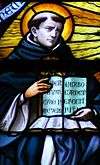List of monastic houses in Scotland
- "Scottish abbey" redirects here. Not to be confused with Schottenstift, Vienna.
List of monastic houses in Scotland is a catalogue of the abbeys, priories, friaries and other monastic religious houses of Scotland.
In this article alien houses are included, as are smaller establishments such as cells and notable monastic granges (particularly those with resident monks). The numerous monastic hospitals per se are not included here unless at some time the foundation had, or was purported to have, the status or function of an abbey, priory, friary or preceptory/commandery.
The geographical co-ordinates provided are sourced from details provided by the Royal Commission on the Ancient and Historical Monuments in Scotland (RCAHMS) and Ordnance Survey publications.
Overview
Article layout
The list is presented alphabetically by council area. Foundations are listed alphabetically within each area.
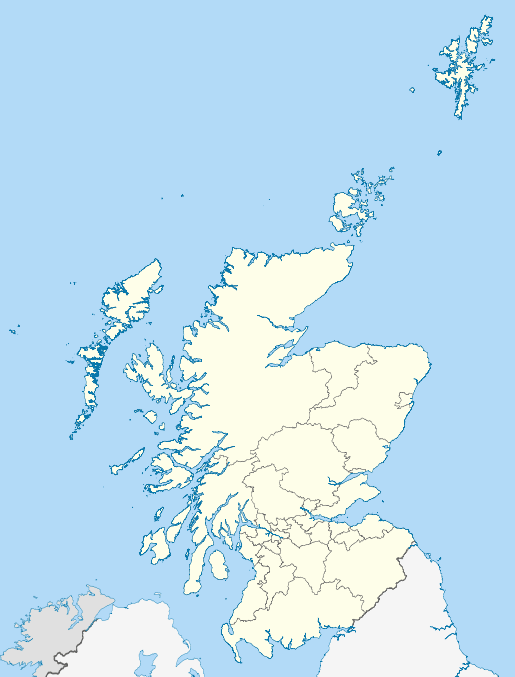
Communities/provenance: shows the status and communities existing at each establishment, together with such dates as have been established as well as the fate of the establishment after dissolution, and the current status of the site.
Formal name or dedication: shows the formal name of the establishment or the person in whose name the church is dedicated, where known.
Alternative names: some of the establishments have had alternative names over the course of time. In order to assist in text-searching such alternatives in name or spelling have been provided.
Monastic glossary: following the listing, provides links to articles on the particular monastic orders as well as other terms which appear in the listing.
Abbreviations and key
Locations with names in italics indicate probable duplication (misidentification with another location) |
|
Communities/provenance: shows the status and communities existing at each establishment, together with such dates as have been established as well as the fate of the establishment after dissolution, and the current status of the site.
Formal name or dedication: shows the formal name of the establishment or the person in whose name the church is dedicated, where known.
Alternative names: some of the establishments have had alternative names over the course of time. In order to assist in text-searching such alternatives in name or spelling have been provided.
Monastic glossary: following the listing, provides links to articles on the particular monastic orders as well as other terms which appear in the listing.
List of establishments by county/region
Aberdeen
| Foundation | Image | Communities & provenance | Formal name or dedication & alternative names |
Online references & location |
|---|---|---|---|---|
| Aberdeen Blackfriars | Dominican Friars founded between 1230 and 1249, purportedly by Alexander II; destroyed by Reformers 4 January 1560; secularised between 1560 and 1587; granted to George, Earl Marischal 17 May 1587; site currently occupied by Robert Gordon's College, Schoolhill - see Parson Gordon's 1661 map showing "Blackfreers". |
St John the Baptist | ||
| Aberdeen Greyfriars | Observant Franciscan Friars founded 1469; secularised 29 December 1559; friars resigned entire possession over to the Town Council; granted to the Town Council by James VI 30 December 1567 for conversion into a hospital; extant buildings passed to George, Earl Marischal 22 September 1593; church became derelict until 1624; restored 1624 by the citizens; in parochial use until 1903 |
[1] 57°08′58″N 2°05′48″W / 57.1494178°N 2.0966506°W | ||
| Aberdeen Monastery | Benedictine monks supposed establishment; founded before 3 April 1231, when the Pope granted the use of the church of Culdedono to the abbot and convent 'de Aberdona' ; possibly no monastic foundation here |
|||
| Aberdeen Nunnery | purported nuns of unspecified order — no evidence of such a foundation | St Catherine | ||
| Aberdeen Preceptory | property of Knights Templars, 'convent and church' are fictitious | |||
| Aberdeen Red Friars | Trinitarians founded before 1274 (1181[note 1]); (William the Lion reputedly granted his royal residence in Aberdeen to two red friars 1211); secularised 1561 |
The Church of the Holy Trinity, Aberdeen | [2] 57°08′44″N 2°05′47″W / 57.1454601°N 2.096318°W | |
| Aberdeen Whitefriars | 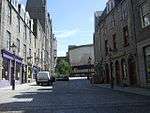 |
Carmelite Friars founded c.1273: grant made by Reginald le Chen; dissolved 1560-83; passed through several ownerships, eventually granted to the Town Council by James VI 26 October 1583 |
[3] 57°08′44″N 2°05′57″W / 57.1455183°N 2.0991075°W | |
Aberdeenshire
| Foundation | Image | Communities & provenance | Formal name or dedication & alternative names |
Online references & location |
|---|---|---|---|---|
| Aberdour Monastery | Celtic monks traditionally founded by Colum Cille and Drostan mac Coscrach, his disciple — provenance doubtful |
|||
| Aberdour Priory | Franciscan nuns founded 1548 by James, Earl of Morton; secularised 1560, leased to Earl of Morton 18 August 1560 |
Aberdene Priory (erroneous) | ||
| Aboyne Preceptory | Knights Templar church granted by Walter Byset, confirmed by Ralph, Bishop of Aberdeen — supposed house |
|||
| Banff Greyfriars | supposed Franciscan Friars Minor, Conventual convent; confusion with Carmelite house[note 2] |
St John | ||
| Banff Whitefriars | Carmelite Friars founded 1321-4, chapel of Our Lady granted by Robert I 21 April 1321, confirmed by him 1 August 1323; burned 20 July 1559; dissolved or secularised 1574, granted to King's College, Aberdeen by James VI 10 September 1574 |
Priory of Bethlem of ye ordour of Carmelits beside Banff | [4] 57°39′15″N 2°32′10″W / 57.6541202°N 2.536212°W | |
| Clova Monastery | Celtic monks dependent on Mortlach; founded before 1157 by St Moluag, reference in bull of Adrian IV who confirmed it to the Bishop of Aberdeen |
Clovett Monastery; St Luke's Chapel |
[5] 57°16′43″N 2°54′15″W / 57.2785491°N 2.9041648°W | |
| Deer Abbey |  |
Celtic monks traditionally founded 6thC by Colum Cille — provenance unreliable Cistercian monks daughter of Kinloss founded 1214/19 by William Comyn, Earl of Buchan; dissolved 1560; erected to a temporal lordship for Robert Keith, becoming Lord Altrie, (charter 1587); (HS) |
The Abbey Church of Saint Mary, Deer | [6] 57°31′24″N 2°3′14.5″W / 57.52333°N 2.054028°W |
| Drumtochty Whitefriars | lands granted to the Carmelite Friars of Aberdeen 1403; supposed foundation – no house existed | |||
| Ecclesgreig Monastery | Celtic monks church of Ecclesgyrg granted to St Andrews by Richard, Bishop of St Andrews, confirmed to St Andrews by William the Lion between 1189 and 1195 |
|||
| Forvie Preceptory | Knights Templar — King's College described as a former Templars' house[note 3] | |||
| Fyvie Priory | Tironensian monks dependent on Arbroath; founded in or before 1285, granted to Arbroath by Reginald le Chen (Cheyne); (asserted foundation 1179 by Fergus, Earl of Buchan likely to be confusion with parish church foundation); united with Arbroath by the Pope 21 August 1459 on petition of the abbot and convent of Arbroath; dissolution unknown, possibly survived to the Reformation |
The Priory Church of The Blessed Virgin Mary and All Saints, Fyvie | [7] 57°25′47″N 2°23′35″W / 57.4296817°N 2.3931742°W | |
| Kennethmont Cell | monks of unspecified order — purported cell burned down at the Reformation; purported collegiate foundation; parish church, no evidence of monastic foundation |
|||
| Monymusk Priory | Culdees founded 1138; Augustinian Canons Regular refounded c.1245; dissolved 1617 |
The Priory Church of Saint Mary and Saint John, Monymusk ____________________ erroneously Monymaill in Fyfe |
[8][9] 57°13′38″N 2°31′21″W / 57.227149°N 2.5224674°W | |
| Mortlach Monastery | traditional early site of bishopric of Aberdeen | |||
| Tullich Preceptory | Knights Templar given as a residence of Templars,[note 4] actually a parochial church held by the Templars and later the Hospitallers[note 5] |
|||
| Turriff Monastery | Celtic monks founded before 1131; dissolved after c.1150 |
St Congan's Church | [10] 57°32′16″N 2°27′56″W / 57.5377583°N 2.465567°W | |
Angus
| Foundation | Image | Communities & provenance | Formal name or dedication & alternative names |
Online references & location |
|---|---|---|---|---|
| Arbroath Abbey |  |
Tironensian monks — from Kelso founded 1176 (1178) by William the Lion; church dedicated 8 May 1233; church damaged by lightning 1380, monks removed temporarily to other locations during repairs; mitred abbey 26 June 1396; dissolved 1606 |
The Abbey Church of Saint Thomas of Canterbury, Arbroath | [11] 56°33′45″N 2°34′56″W / 56.56250°N 2.58222°W |
| Barry Red Friars | purported Trinitarians supposedly founded 1212 by William the Lion,[note 6] built and endowed by Alexander II — supposed house – fictional |
domus Barensis | ||
| Brechin Monastery |  |
Culdees probably founded before 975; site now occupied by Brechin Cathedral, a congregation of the Church of Scotland. |
[12] 56°43′51″N 2°39′41″W / 56.730732°N 2.6615077°W | |
| Brechin Red Friars | Trinitarians purportedly founded 1256 by "Edward, Bishop of Brechin"[note 7] (no such bishop), or c.1258 by David I[note 8] — reliable evidence lacking |
|||
| Brechin Whitefriars ? | supposed Carmelite Friars founded 1376 (in the tenure of Stephen Dempster, Bishop of Brechin) by Malcolm Dempster, Baron of Careston — supposed foundation – details unsubstantiated |
|||
| Dundee Blackfriars | Dominican Friars founded c.1521, benefactions by Andrew Abercromby, Burgess of Dundee; (charters 4 September 1315, 1345 and 1388 not considered authentic); petition to the pope by Scottish provincial 16 September 1517 to establish the house; sacked by mob August 1543; probably destroyed November 1548 when the English burned the town |
dedication unknown | [13] 56°27′39″N 2°58′25″W / 56.4608611°N 2.9737222°W | |
| Dundee Greyfriars | Franciscan Friars Minor, Conventual founded before 1289 by Devorgilla;[note 9] built before 1296;[note 10] dissolved or secularised c.1560 |
[14] 56°27′40″N 2°58′22″W / 56.4610849°N 2.9727888°W | ||
| Dundee Priory | Franciscan nuns founded 1501/2 by James Fotheringham (spurious charter of grant by James Graham of Fintry and Claverhouse); secularised 1560, the Magistrates of Dundee confirmed in possession 14 April 1567 |
|||
| Dundee Red Friars | purported Trinitarians purportedly founded 1283 by Sir James Scrymgeour; probably hospital – reference to monastic house probably erroneous |
|||
| Kettins Red Friars | purported Trinitarians parish church appropriated to hospital of bridge of Berwick, and thereafter to the Trinitarians — no Trinitarian house |
Katnes; Ketnes |
||
| Monifieth Monastery | Culdees founded 12thC; secularised by c.1220: land granted to Nicholas, witness to charters of Countess Matilda, by Earl Malcolm c.1220; land granted to Arbroath 1242-3 |
[15] 56°28′50″N 2°49′16″W / 56.4804939°N 2.8211716°W | ||
| Restenneth Priory | possible early foundation built c.710 at the instance of Nechtan, King of the Picts; Augustinian Canons Regular founded between 1161 and 1162, St Peter's church granted to Jedburgh by Malcolm IV; dissolved or secularised 1606 |
St Peter ____________________ Restennet Priory; Rostin Priory; Rostinoth Priory; Roslin Priory (erroneous reference) |
[16] 56°39′12″N 2°50′46″W / 56.6532778°N 2.846092°W | |
The following location in Angus has no monastic connection:
- Rossie Priory: mansion, built 1807
Argyll & Bute
| Foundation | Image | Communities & provenance | Formal name or dedication & alternative names |
Online references & location |
|---|---|---|---|---|
| Artchain Monastery, Isle of Tiree |
Celtic monks founded 6thC? by Findchan, contemporary of Colum Cille |
|||
| Ardchattan Priory | 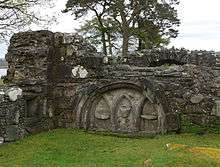 |
Celtic monks founded by Findchan; Valliscaulian monks — from Val des Choux founded 1230/1; part of church in parochial use to 1722; site now largely occupied by Victorian house; (HS) |
The Priory Church of Saint John the Baptist, Ardchattan | [17] 56°27′47″N 5°17′38″W / 56.4630269°N 5.2938706°W |
| Bledach Monastery, Isle of Tiree |
Celtic monks founded before 577 by Brendan, founder abbot of Clonfert |
|||
| Cara Red Friars | purported Trinitarians asserted cell; chapel only, no Trinitarian foundation |
St Fionnlugh's Chapel | [18] 55°38′06″N 5°44′58″W / 55.6350576°N 5.7495447°W | |
| Cella Diuni, Loch Awe | Celtic monks possibly founded by Diun |
St Columba's Church; Kilneuair |
[19] 56°10′44″N 5°24′09″W / 56.1788498°N 5.4024429°W | |
| Colonsay Abbey | Augustinian Canons Regular asserted abbey; evidence of monastic house lacking |
|||
| Garvellach Islands Monastery | traditionally founded late-6thC by Brendan, founder abbot of Clonfert; probably on the island of Eileach an Naoimh |
Ailech Monastery Eileach-an-Naoimh Monastery |
||
| Hinba Monastery | Celtic monks founded before 597 by Colum Cille, probably on the island of Jura |
possibly Jura Monastery (v. infra) | ||
| Inchkenneth Monastery ? | purported monastery – island in ownership of Iona Nunnery — evidence of parish church only | |||
| Inchmarnock Monastery | purported cell of monks — parish church only – island held by Crossraguel, exchanged with Saddell 17 January 1390/1 — no evidence of monastic foundation | Inchmernock | ||
| Inishail Priory | supposed Cistercian nuns remains of a building purportedly a nunnery; purportedly granted to Hay, Abbot of Inchaffray actually a parochial church appropriated by Inchaffray — supposed priory fictitious |
|||
| Iona Abbey + |  |
Celtic monks founded c.565 by Colum Cille; plundered by the Norse 795 and 802; Benedictine monks abbey founded 1203; dubiously conjectured to have been Tironensian[note 11] dissolved 1587/8(?); cathedral, request made by the Crown to the Pope 1 April 1498 to establish a see pending the recovery of the see in the Isle of Man from the English, apparently unsuccessful, the monks holding the abbey in commendam from 1499; no evidence of a cathedral chapter being established; now restored and in use as ecumenical Christian community; (HS) |
[20] 56°20′02″N 6°23′36″W / 56.333967°N 6.393249°W | |
| Iona Priory | 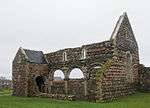 |
Augustinian Canonesses founded before 1208, purportedly by Ragnall mac Somairle (Reginald, son of Somerled); secularised after 1574, granted to Hector McLean of Duart; (HS) |
St Mary ____________________ Iona Nunnery |
56°19′50″N 6°23′36″W / 56.3305232°N 6.3932168°W |
| Jura Monastery | possibly Hinba Monastery | Hinba Monastery? (v. supra) | ||
| Kerrara Priory | Cistercian monks apparent intended foundation after 1292 never implemented; no evidence of monastic foundation or occupation by monks on the island |
|||
| Kingarth Monastery | Celtic monks founded 6thC, purportedly by St Blane; seat of bishopric; (HS) |
Cinngrad Monastery | [21] 55°44′13″N 5°02′10″W / 55.7368348°N 5.0360084°W | |
| Lismore Monastery | founded before 592 by Lugaid or Moluag | |||
| Mag Luinge, Isle of Tiree | founded before 597; probably at Soroby; destroyed by fire 673; restored |
|||
| Oronsay Priory | Augustinian Canons Regular founded before 1353 (1330), accredited to John, Lord of the Isles; dissolved or secularised 1617, land granted to the Bishop of the Isles by James VI 15 February 1616 |
The Priory Church of Saint Oran, Oronsay | [22] 56°01′12″N 6°15′17″W / 56.019902°N 6.25467°W | |
| Rothesay Abbey | ruined church possibly referred to as St Mary's Abbey[note 12] — evidently medieval parish church — no monastic foundation | 'St Mary' | ||
| Saddell Abbey |  |
Cistercian monks daughter of Mellifont, Louth, Ireland; founded before 1207 by Reginald, son of Somerled, Lord of the Isles; dissolved c.1507; confirmed to the Bishop by James VI 1 January 1507 |
[23] 55°31′56″N 5°30′40″W / 55.532163°N 5.5111939°W | |
| Sgòr Nam Ban-Naomha Monastery | ||||
| Texa Cell | purported monks' cell[note 13] evidence of church — cell apocryphal |
Helentexa | ||
| Tiree Monastery | founded c.564-565 by Comgall, founder abbot of Bangor; soon abandoned due to raids by the Picts |
[24][25] 56°30′01″N 6°54′34″W / 56.5002062°N 6.9093651°W |
Ayrshire
East Ayrshire
| Foundation | Image | Communities & provenance | Formal name or dedication & alternative names |
Online references & location |
|---|---|---|---|---|
| Mauchline Priory | Cistercian monks grange or 'cell' of Melrose founded 1165, purportedly by David I |
The Priory Church of Saint Cuthbert, Mauchline | [26] |
North Ayrshire
| Foundation | Image | Communities & provenance | Formal name or dedication & alternative names |
Online references & location |
|---|---|---|---|---|
| Fintray Priory | supposed Tironensian monks house built c.1386, determined to be imaginary |
|||
| Holy Island | purported monastery traditionally founded by Ranald, King of the Isles and Argyll or Johne, Lorde of the iles (probably John of Islay); island possessed by Iona — no evidence of monastic foundation | |||
| Irvine Whitefriars | Carmelite Friars probably founded before 1293 by a Fullerton of Fullerton; dissolved or secularised 1572; granted to the Royal School of Irvine by James VI 8 June 1572 |
[27] 55°36′46″N 4°40′25″W / 55.612693°N 4.6736814°W | ||
| Kilwinning Abbey |  |
Tironensian monks from Kelso founded between 1162 and 1189; dissolved 1592 |
The Abbey Church of the Blessed Virgin Mary, and Saint Winning, Kilwinning | [28][29] 55°39′12″N 4°41′55″W / 55.6534215°N 4.6986508°W |
| Kilwinning Convent | Situated at Stanecastle and mentioned in several charters | |||
| Southannan Priory | Franciscan nuns spurious charter of William, Lord Semple; purportedly reduced to ashes at the Reformation; supposed foundation – spurious provenance; only chapel of St Anandi and graveyard chantry mentioned at the site |
[30] |
Ayrshire, North non-Christian monasteries
| Foundation | Image | Communities & provenance | Formal name or dedication & alternative names |
Online references & location |
|---|---|---|---|---|
| Holy Island Monastery | Tibetan Buddhist |
South Ayrshire
| Foundation | Image | Communities & provenance | Formal name or dedication & alternative names |
Online references & location |
|---|---|---|---|---|
| Ayr Blackfriars | Dominican Friars founded before August 1242 (1230) by Alexander II, who endowed the church; leased by the Crown 4 June 1565; secularised 1567, granted to the Burgh of Ayr by charter of Queen Mary 14 April 1567; demolished after the Reformation |
The Friary Church of Saint Katherine, Ayr | ||
| Ayr Greyfriars | Observant Franciscan Friars founded 1474 (1472, or between 1488 and 1497), attributed to the citizens; dissolved or secularised 1567; |
St John the Baptist ____________________ Auld Kirk of Ayr |
[31] 55°27′46″N 4°37′43″W / 55.4627865°N 4.6287096°W | |
| Crossraguel Abbey |  |
Cluniac monks oratory founded before 1214-16 (1244); raised to abbey status, dependent on Paisley from before 1270; dissolved 1617; (HS) |
The Abbey Church of Saint Mary, Crossraguel | [32][33][34][35] 57°08′55″N 2°05′15″W / 57.148603°N 2.0876169°W |
| Dalmilling Priory | Gilbertine Canons and nuns — double house founded 1219-28; dissolved 1238 |
Dalmulin Priory | [36] 55°27′50″N 4°35′47″W / 55.4640151°N 4.5964158°W | |
| Fail Monastery |  |
Trinitarians founded before 1335; dissolved 1561 |
St Mary ____________________ Failford Abbey; Fail Monastery, Tarbolton |
[37] 55°31′34″N 4°30′09″W / 55.5260056°N 4.5025063°W |
| Fail Crutched Friars | supposed Polish Crutched Friars possible confusion with Trinitarian monastery |
Pful Friary; Phall Friary; Faill Friary; Fayl in Scotia Friary |
||
| Fail Priory | supposed Cluniac monks probable confusion with Trinitarian monastery |
Feale Monastery | ||
| Kar Monastery | Order of Vaudey — no record of monks residing here; land granted to Melrose in perpetual lease 1223; (alternatively given as located in Galloway) | |||
| Ladykirk Preceptory | Knights Templar secular chapel founded c.1446 by John Blair — misleading references to preceptory |
Our Lady Kirk of Kyle | ||
| Lochfeal Red Friars | purported Trinitarians — no such house | |||
Dumfries and Galloway
| Foundation | Image | Communities & provenance | Formal name or dedication & alternative names |
Online references & location |
|---|---|---|---|---|
| Canonbie Priory |  |
Augustinian Canons Regular dependent on Jedbugh; founded between before 1165 and 1170; dissolved or secularised 1606 |
[38] 55°04′25″N 2°56′28″W / 55.0736777°N 2.9410636°W | |
| Dercongal Abbey | 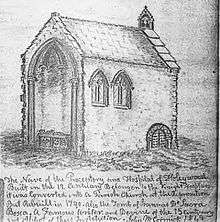 |
Premonstratensian Canons — from Soulseat founded before 1225, founder unknown;[note 14] dissolved or secularised 1609 |
The Abbey Church of Saint Mary, Holywood ____________________ Holywood Abbey |
[39] 55°06′02″N 3°38′24″W / 55.1004623°N 3.639999°W |
| Dumfries Blackfriars | supposed Dominican Friars[note 15][note 16][note 17] | [40] 55°04′03″N 3°36′51″W / 55.0675803°N 3.6140836°W | ||
| Dumfries Greyfriars | Franciscan Friars Minor, Conventual founded before 1266 by Devorgilla de Balliol (20 April 1234(?)[note 18] by Alan of Galloway, or c.1262[note 19]/before 1305[note 20]) dissolved or secularised 1569, Burgh of Dumfries granted revenues and land 23 April 1569; Town Council gained possession by 1570[note 21] |
St Mary | ||
| Dundrennan Abbey | .jpg) |
Cistercian monks — from Rievaulx daughter of Rievaulx; founded 1142 by David I, or possibly Fergus of Galloway; dissolved 1560; granted to Edward Maxwell 14 August 1562; secularised 1606; (HS) |
The Abbey Church of Saint Mary, Dundrennan | [41] 55°06′02″N 3°38′24″W / 55.1004623°N 3.639999°W |
| Glenluce Abbey | _-_geograph.org.uk_-_490895.jpg) |
Cistercian monks — from Melrose daughter of Dundrennan; founded 1191/2, purportedly by Roland of Galloway, Constable of Scotland; dissolved or secularised 1560; granted to the Bishop of Galloway 1619; (HS) |
The Abbey Church of Saint Mary, Glenluce ____________________ Luce Abbey |
[42] 54°53′21″N 4°49′53″W / 54.88917°N 4.83139°W |
| Hoddam Monastery | Celtic monks founded before 612 by Kentigern? (traditionally association), who reputedly built church and located the see of his bishopric here |
[43] 55°02′29″N 3°18′17″W / 55.0413151°N 3.3047605°W | ||
| Kar Monastery | given as located in Galloway, probably South Ayrshire (v. supra) | |||
| Kilconquhar Monastery | purportedly Benedictine monks founded by Fergus (or Ethred), Lord of Galloway — no such location or monastery | |||
| Kirkcudbright Blackfriars | Dominican Friars probably erroneous reference to the house of Greyfriars (see immediately below)[note 22] |
|||
| Kirkcudbright Greyfriars + | Franciscan Friars Minor, Conventual founded c.1450 (between 1449 and 1456) by James II; (or 1239, purportedly by Roger de Quincy, Earl of Winchester, Lord of Galloway and Constable of Scotland[note 23]); dissolved or secularised 1569; destroyed and ruinous before 6 December 1569 when granted to Thomas MacLellan of Bombie by James IV; granted to the Town Council 24 March 1570/1 by Thomas MacLellan, conventual church in parochial use from 24 March 1570/1 |
[44] 54°50′08″N 4°03′16″W / 54.835636°N 4.0544271°W | ||
| Kirkcudbright Monastery | scholars of a religious community apparently serving a foundation here; still in possession of the church 1164 |
|||
| Lincluden Priory |  |
Benedictine nuns founded 1164 (before 1174) by Uchtred mac Fergus, Lord of Galloway or Malcolm IV; also given as Cluniac nuns; dissolved 1389; secular canons college late-14thC; (HS) |
[45] 55°05′04″N 3°37′11″W / 55.0845822°N 3.6197805°W | |
| Lochkindeloch Priory | Cistercian monks — supposed foundation; parish church, but no religious house in the parish other than Sweetheart Abbey | |||
| St Evoca Priory | Cistercian nuns founded before 1423; dissolution unknown |
St Evoca the Virgin | ||
| St Mary's Priory, St Mary's Isle (Isle of Trahil) | Augustinian Canons Regular — from Holyrood founded c.1138 (before 1173); dissolved or secularised 1608 |
Prioratus Sanctae Mariae de Trayl ____________________ St Mary's Isle Priory; Trail Priory; Traill Priory |
[46] 54°49′03″N 4°04′03″W / 54.8175028°N 4.067452°W | |
| Soulseat Abbey | Premonstratensian Canons — from Prémontre founded 1161(?) (1152); dissolved or secularised 1630 |
The Abbey Church of Saint Mary and Saint John, Soulseat ________________ Saulseat Abbey |
[47] 54°53′14″N 4°57′45″W / 54.8871452°N 4.9625319°W | |
| Soulseat Priory | Cistercian monks uncertain foundation; unverified location and identification |
Viride Stagnum | ||
| Sweetheart Abbey | 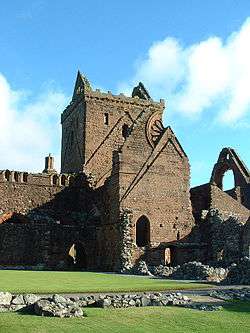 |
Cistercian monks — from Dundrennan founded 1275 by Devorgilla, widow of John Balliol, endowment by Devorgilla 10 April 1273; dissolved May 1565; granted to William Lesley 1586; secularised 1624, erected to a temporal lordship for Sir Robert Spottiswoode; (HS) |
The Abbey Church of Saint Mary, Sweetheart ____________________ New Abbey |
[48] 54°58′44″N 3°36′59″W / 54.97889°N 3.61639°W |
| Tongland Abbey | 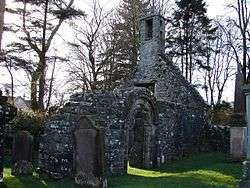 |
Premonstratensian Canons — from Cockersand, Lancashire daughter of Cockersand; founded 1218; dissolved or secularised 1612 |
[49] 54°51′47″N 4°01′48″W / 54.8630151°N 4.0300781°W | |
| Whithorn Priory |  |
possible [non-monastic] Christian community late 4thC; possibly monastic by 8thC; Premonstratensian Canons daughter of Soulseat founded c.1175 or before 1161 by Fergus, Prince of Galloway; dissolved or secularised 1612; cathedral church of Galloway; (HS) Whithorn |
[50] 54°44′01″N 4°25′03″W / 54.7334919°N 4.4174695°W | |
| Wigtown Blackfriars | Dominican Blackfriars founded 1267 or before 1287 by Devorgilla, daughter of Alan of Galloway; secularised 1560-70(?), probably granted to the Burgh of Wigtown (though no record found) |
The Annunciation of the Blessed Virgin Mary | 54°52′01″N 4°26′31″W / 54.867°N 4.442°W | |
Dumfries and Galloway non-Christian monasteries
| Foundation | Image | Communities & provenance | Formal name or dedication & alternative names |
Online references & location |
|---|---|---|---|---|
| Samye Ling Monastery *, Langholm | Karma Kagyu school Tibetan Buddhist 1967 | Kagyu Samye Ling Monastery and Tibetan Centre |
Dunbartonshire
West Dunbartonshire
| Foundation | Image | Communities & provenance | Formal name or dedication & alternative names |
Online references & location |
|---|---|---|---|---|
| Ross Priory, Loch Lomond | doubtful establishment, probable early-19thC invention; country house |
[51] 56°03′17″N 4°32′51″W / 56.0546176°N 4.5473957°W |
City of Edinburgh
| Foundation | Image | Communities & provenance | Formal name or dedication & alternative names |
Online references & location |
|---|---|---|---|---|
| Edinburgh Blackfriars | Dominican Friars founded 1230 by Alexander II, site of the king's manor house granted to the friars by him; dissolved or secularised 1566/7, granted to the magistrates and Edinburgh Town Council 13 March 1566/7 |
The Assumption of the Blessed Virgin Mary | [52] 55°56′55″N 3°11′05″W / 55.9486231°N 3.1847692°W | |
| Edinburgh Greenside Whitefriars | Carmelite Friars founded 1520-5, site granted by the town, with the permission of the king and the bishop of St Andrews; dissolved or secularised before 1563 |
[53] 55°57′26″N 3°10′58″W / 55.9572621°N 3.182846°W | ||
| Edinburgh Greyfriars |  |
Observant Franciscan Friars founded c.1463; destroyed by Reformers 14 June 1559; dissolved or secularised 1562; Greyfriars Tolbooth & Highland Kirk built on site 1602-20 |
55°56′48″N 3°11′32″W / 55.9466°N 3.1922°W | |
| Edinburgh Preceptory | property - asserted preceptory[note 24] | |||
| Edinburgh Sciennes Priory | Dominican nuns founded 1517, erroneously asserted to have been founded by Lady Roslin, Countess of Caithness; secularised 1569 |
St Katherine of Senis | [54] 55°56′14″N 3°11′09″W / 55.9373286°N 3.1857536°W | |
| Holyrood Abbey, Edinburgh |  |
Augustinian Canons Regular — from St Andrews daughter of Merton, Surrey; founded 1128 by David I; sacked by the English 1322; burned by the English 1385; dissolved or secularised 1606; erected into temporal lordship for John Bothwell, son of the bishop 1606 (in parliament), charter 1607; nave in use as the parish church of the Canongate until 1686; partly absorbed into 17thC Holyrood Palace; served as Chapel Royal until mid-18thC; (HS) |
The Abbey Church of Saint Mary, Saint Andrew and All Saints, Holyrood | [55] 55°57′12″N 3°10′16″W / 55.9532246°N 3.1711864°W |
| South Queensferry Whitefriars |  |
Carmelite Friars founded 1 March 1440/1 (purportedly founded 1330 by the laird of Dundass,[note 25] or 28 November 1333[note 26]); dissolved before 1564/5; prior granted lease 27 February 1564/5; let by Sir Walter Dundas to the Balies and Town Council of Queensferry as a place of worship and school; present parochial church built on site 1635[note 27] |
Queensferry Friary | [56] 55°59′27″N 3°23′54″W / 55.9908866°N 3.3982301°W |
| Sciennes Priory | Franciscan nuns spurious charters including grant by Margaret Knox, daughter of Uchtred Knox of Ranfurly to build a hospital |
Eilean Siar
| Foundation | Image | Communities & provenance | Formal name or dedication & alternative names |
Online references & location |
|---|---|---|---|---|
| Barra Red Friars | Trinitarians purported cell – possible church of Celtic origin, supposed house – lacking evidence |
The Holy Trinity | ||
| Carnish 'Cell' | Augustinian Canons Regular asserted cell of Inchaffray, purportedly founded by the Macleods of the Lewis; evidence of monastic house lacking |
Scarinche | ||
| Nuntown Priory | nuns of unspecified order — probably spurious account of building on Benbecula 'locally believed to have been a nunnery'[note 28] | |||
| Rowadil Priory | Augustinian Canons Regular; asserted priory; purportedly founded by MacLeod of Harris; evidently no more than parochial church or chapel |
Rodwil; Rowadill; Rodel |
[57] |
Fife Region
| Foundation | Image | Communities & provenance | Formal name or dedication & alternative names |
Online references & location |
|---|---|---|---|---|
| Balmerino Abbey | Cistercian monks — from Melrose dependent on Melrose; founded c.1227/9; dissolved 1560; secularised 1603; (NTS) |
The Abbey Church of Saint Mary and Saint Edward | [58] 56°24′36″N 3°02′30″W / 56.4099722°N 3.0417752°W | |
| Buchan Priory | grant to the canons of St James's, Buchan by the Pope 18 October 1221 - no known house or churches held by regular canons in Buchan, Aberdeenshire - possibly erroneous reference to a location outside Scotland | |||
| Carnbee Preceptory | Knights Templar foundation unknown; suppressed c.1309 |
|||
| Crail Blackfriars | purported Dominican Friars site granted for a church and monastery, (spurious charter purportedly of Elizabeth Hepburn, Abbess of Haddington 28 September 1448[note 29]); reliable evidence of foundation lacking |
|||
| Crail Priory | nuns of unspecified order – apocryphal establishment | |||
| Culross Abbey + | Cistercian monks — from Kinloss dependent on Kinloss; founded before 1217/8; dissolved 1560; erected into a temporal lordship for James Colville of Easter Wemyss (charters 1589, 1609); currently partly in use as a parish church; (HS) |
The Abbey Church of Saint Mary, Saint Andrew and Saint Serf, Culross | [59] 56°03′30″N 3°37′31″W / 56.0583587°N 3.6253274°W | |
| Cupar Blackfriars | Dominican Friars founded 1348: petition by Duncan, Earl of Fife to the Pope 1348, to found a Dominican convent at his castle; permission granted by the Pope for the vicar-general in Scotland of the English provincial to built a church and oratory; reportedly in a state of collapse by 13 November 1517; proposal to close the house approved 1518, confirmed by Crown charter 4 October 1519; incorporated with the house at St Andrews, where the friars transferred 1519; granted to the Burgh of Cupar by James VI 14 June 1572 |
St Katherine | [60] 56°19′11″N 3°00′36″W / 56.3197129°N 3.0101375°W | |
| Cupar Red Friars | purported Trinitarians allegedly founded 1277 by James, Earl of Fife — no such person – fictitious house | |||
| Dunet Red Friars | purported Trinitarians allegedly founded 1297 — supposed house – probably fictitious |
Dumeni; Dunetum; Dumenum |
||
| Dunfermline Abbey | 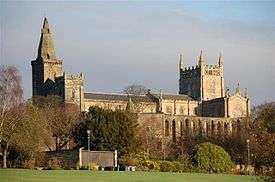 |
Benedictine monks priory founded c.1070; raised to abbey status 1124/1128; dissolved 1593, annexed to the Crown |
[61] 56°04′11″N 3°27′47″W / 56.0697958°N 3.4631395°W | |
| Dysart Blackfriars | supposed Dominican Friars[note 30][note 31] reliable evidence of foundation lacking; long-ruined chapel converted for use as a forge |
St Dennis (chapel); St Cuthbert (church) |
[62] 56°07′29″N 3°07′14″W / 56.124671°N 3.1206295°W possible | |
| Gadvan Preceptory |
Cistercian monks cell dependent on Balmerino; founded before 1475; dissolved or secularised before 1578 |
[63] 56°20′57″N 3°09′29″W / 56.3492788°N 3.1581509°W | ||
| Inchcolm Abbey |  |
Augustinian Canons Regular founded 1123 |
The Abbey Church of Saint Columba, Inchcolm ____________________ St Colm's Abbey, Inch |
[64] 56°01′48″N 3°18′06″W / 56.0299716°N 3.3017725°W |
| Inchcolm Hermitage | purported hermit residence on the island prior to the foundation of the Augustinian house (see immediately above) | |||
| Inverbervie Whitefriars | Carmelite Friars founded before 1443, endowments by William, Earl of Keith and Alexander Strachan of Dullevarde 10 December 1443 (two spurious charters of foundation: 1358 by David II; 12 November 1388 by Mark Rait of Halgreen); dissolved or secularised before 1570; grant of friars' land and property made 15 October 1570; granted to hospital in Montrose 23 July 1571 |
Bervie Whitefriars | ||
| Inverkeithing Blackfriars | supposed Dominican Friars some references probably pertain to the Franciscan friary[note 32][note 33] |
[65] 56°01′22″N 3°23′51″W / 56.0228222°N 3.3974791°W | ||
| Inverkeithing Greyfriars | Franciscan Friars Minor, Conventual founded 1268(?) (before 1384), built by Philip de Moubray, Lord of Barnbougle; dissolved or secularised 1559 |
possibly The Friary Church of Saint Mary, Inverkeithing | [66] 56°01′47″N 3°23′54″W / 56.0297648°N 3.3983588°W | |
| Isle of May Monastery | conjectural Culdees or monks establishment[note 34] | |||
| Isle of May Priory |  |
Benedictine monks — from Reading, Berkshire dependent on Reading; Augustinian Canons Regular dependent on St Andrews; refounded late-13th/early-14thC; transferred to Pittenweem late-13th/early-14thC |
The Priory Church of Saint Oran and Saint Colman, Isle of May ____________________ May Priory |
[67][68] 56°11′08″N 2°33′27″W / 56.1856289°N 2.5574166°W |
| Kilconquhar Nunnery | Benedictine nuns actually a parochial church owned by North Berwick Nunnery; sometimes (erroneously) noted as located in Galloway | |||
| Kilrimont Monastery | Culdees traditionally founded by Ungus mac Urguist; collegiate founded 1240s |
Cill-rigmonaid Monastery; Cenn-rigmonaid Monastery; Kilrymont monastery |
[69] 56°20′23″N 2°47′06″W / 56.3398°N 2.7851°W | |
| Kinghorn Blackfriars | purported Dominican Blackfriars[note 35][note 36] very dubious |
[70] 56°04′12″N 3°10′27″W / 56.070135°N 3.174275°W | ||
| Lindores Abbey | 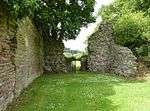 |
Tironensian monks — from Kelso founded c.1190 (between c.1190 and 1191) by David, Earl of Huntingdon; dissolved or secularised 1600 |
The Abbey Church of Our Lady and Saint Andrew | [71] 56°21′10″N 3°13′41″W / 56.35274°N 3.22816°W |
| Maryculter Preceptory | Knights Templar founded between 1221 and 1236 by Walter Byset; suppressed c.1309 Knights Hospitaller transferred c.1309; dissolved c.1513 |
Culter Preceptory | ||
| Pittenweem Priory | Augustinian Canons Regular transferred from Isle of May c.1200 |
[72] 56°12′49″N 2°43′40″W / 56.2136016°N 2.7277637°W | ||
| St Andrew's Blackfriars | _20080503.jpg) |
Dominican Friars purportedly founded 1274 by William Wishart, Bishop of St Andrews; destroyed by fire by Norman Lesley 1547; destroyed by Reformers 14 June 1599 dissolved or secularised 1567, granted to the municipality of St Andrews by Queen Mary 17 April 1567 |
The Assumption and Coronation of the Blessed Virgin Mary ____________________ Blackfriars Chapel |
[73] 56°20′20″N 2°47′53″W / 56.3388972°N 2.7979249°W |
| St Andrew's Cathedral Priory |  |
Celtic monks founded before 747; Culdees founded 9th/10thC cathedral founded 908 Augustinian Canons Regular cathedral priory founded 1144, and endowed by Robert, Bishop of St Andrews; dissolved or secularised 1592, erected into a temporal lordship for the duke, in parliament 1592, 1606; (HS) |
The Cathedral and Priory Church of Saint Andrew, Saint Andrews ____________________ Cennrigmonaid |
[74] 56°20′24″N 2°47′15″W / 56.340033°N 2.7875233°W |
| St Andrew's Greyfriars | Observant Franciscan Friars founded between 1463 and 1466 by James Kennedy, Bishop of St Andrew's, purported (spurious) papal bull of Pius II of foundation 24 November 1458; burned by Norman Lesilie July 1547; dissolved or secularised 1559-1567; resigned to the magistrates 18 May 1559; destroyed by Reformers on or c.14 June 1559; granted to the Burgh of St Andrew's by Queen Mary 17 April 1567 |
|||
| St Andrew's Red Friars | purported Trinitarians — fictitious house | |||
| St Andrew's Whitefriars | asserted Carmelite Friars founded 1370 by 'Bishop William de Laverdale' [sic] (possibly William de Landallis); — uncertain foundation |
|||
| St Ninian's Blackfriars | Dominican Blackfriars[note 37] erroneous reference to St Monan's | |||
| St Monan's Blackfriars + |  |
church founded as a chapel 3 April 1370 by David II Dominican Friars refounded 15 November 1471 by James III; conventual status by bull of Sixtus IV procured by the vicar-general and the king 18 March 1476/7; incorporated into St Andrews Michaelmas 1519; secularised c.1567 |
The Friary Church of Saint Monan, Saint Monan's ____________________ erroneously 'St Ninians' [note 37] |
56°12′12″N 2°46′16″W / 56.2032129°N 2.7710786°W |
| St Rule's Priory |  |
Augustinian Canons Regular — from Scone founded 1133-1144; (HS) |
The Priory Church of Saint Rule, Saint Andrews | [75] 56°20′23″N 2°47′11″W / 56.3396524°N 2.7864718°W |
The following locations in the Fife Region have no monastic connection:
- Crawford Priory: mansion, built 1813
- Inchyre Abbey: mansion, built 19thC
City of Glasgow
| Foundation | Image | Communities & provenance | Formal name or dedication & alternative names |
Online references & location |
|---|---|---|---|---|
| Glasgow Austin Friars ? | Augustinian Friars? church founded by laymen, granted to three hermits of the order in the Glasgow diocese c.1453 — unidentified foundation |
|||
| Glasgow Blackfriars # | Dominican Friars founded before 1246, purportedly by the bishop and chapter, papal bull of Innocent IV 10 July 1246 granted indulgence to those contributing to the building of the church; secularised 1566/7; granted by Mary, Queen of Scots to the University of Glasgow and served as a parish church 16 March 1566/7; conventual church destroyed by fire c.1670; rebuilt 1699-1702; demolished when the university re-located in the 1870s |
St John the Evangelist ____________________ Old College Church |
[76] 55°51′31″N 4°14′25″W / 55.8585809°N 4.2402023°W | |
| Glasgow Franciscan Friary | Franciscan Friars | Roman Catholic Church Of Saint Luke; Blessed John Duns Franciscan Friary |
[77] 55°50′59″N 4°14′47″W / 55.8496621°N 4.2463714°W | |
| Glasgow Greyfriars # | Observant Franciscan Friars founded 1473-9 (1477, 1472), mistakenly attributed to the archbishop; dissolved or secularised 1566/7 |
Church of The Blessed Virgin Mary | [78] 55°51′38″N 4°14′32″W / 55.8604234°N 4.2422462°W | |
| Glasgow Dominican Priory | Dominican nuns proposed foundation: bequeathal by Roland Blacadyr — foundation never implemented |
St Catherine of Siena | ||
| Govan Monastery | traditionally founded late-6thC by Constantine — evidence lacking | |||
Highland Region
| Foundation | Image | Communities & provenance | Formal name or dedication & alternative names |
Online references & location |
|---|---|---|---|---|
| Applecross Monastery | Celtic monks founded 673 by Mael-rubai, Abbot of Bangor |
St Maelrubha's Monastery | [79] 57°26′42″N 5°48′44″W / 57.4450061°N 5.8121447°W | |
| Beauly Priory | Valliscaulian monks — from Val des Choux dependent on Val des Choux; founded 1230; dissolved 1510; Cistercian monks founded 1510 on the suppression of the Valliscaulian order; purportedly erected to a temporal lordship for Lord Hay of Sala 1612, (apparently erroneously noted); granted to the Bishop of Ross (charter 20 October 1634); (HS) |
The Priory Church of The Blessed Virgin Mary and Saint John the Baptist, Beauly | [80] 57°29′05″N 4°27′27″W / 57.4846827°N 4.4575524°W | |
| Cromarty Red Friars | purported Trinitarians no evidence of Trinitarian foundation here |
Crenach ? | ||
| Dornoch Cell ? | Benedictine monks founded before early-12thC; possible community established from Dunfermline or earlier community already established here |
|||
| Dornoch Red Friars | asserted Trinitarians founded 1271 by Sir Patrick Murray or the Reguli of Sutherland supposed house – evidence lacking – probably fictitious |
|||
| Eigg Monastery | founded before 617 by St Donnan | Kildonnan Monastery | [81] 56°53′16″N 6°08′21″W / 56.8876782°N 6.1390398°W | |
| Fearn Abbey |  |
Premonstratensian Canons daughter of Whithorn; founded 1221-2 (or c.1227 at Old Fearn); dissolved 1609 |
The Abbey Church of Saint Ninian, Fearn | [82] 57°46′12″N 3°57′23″W / 57.7700948°N 3.9562583°W |
| Fort Augustus Abbey |  |
built as a military fort, Benedictine abbey and school in 20thC, now in private ownership | [83] 57°08′41″N 4°40′36″W / 57.1446802°N 4.6766782°W | |
| Inverness Blackfriars | Dominican Friars founded after 1214 and before 1240 by Alexander II; secularised before 19 January 1566/7; destroyed by Cromwell, masonry used in the construction of a citadel at the north of the town |
St Bartholomew | [84] 57°28′50″N 4°13′48″W / 57.4806259°N 4.2298881°W | |
| Inverness Greyfriars | confusion with Inverness Blackfriars | |||
| Kingussie Whitefriars # | Carmelite Friars founded before 1501 by George, Earl of Huntly; dissolved or secularised after 1560 |
St Columba's Friary | [85] 57°04′52″N 4°03′09″W / 57.0809868°N 4.0524328°W | |
| Murkle Priory | nuns of uncertain order — supposed foundation – unverified | Glosters Priory | ||
| North Rona Monastery | 7thC | |||
| Old Fearn Abbey | Premonstratensian Canons founded c.1227 |
57°51′43″N 4°19′04″W / 57.8619227°N 4.3177986°W approx |
Lanarkshire
South Lanarkshire
| Foundation | Image | Communities & provenance | Formal name or dedication & alternative names |
Online references & location |
|---|---|---|---|---|
| Blantyre Priory | Augustinian Canons Regular cell dependent on Jedburgh founded between 1238 and 1249 by Patrick (II), Earl of Dunbar and his wife Euphemia; dissolved or secularised 1598/9 |
[86] 55°48′39″N 4°05′55″W / 55.8108077°N 4.0986192°W | ||
| Culter Preceptory | Knights Templar — no such house – confusion with Maryculter (v. supra) | |||
| Lanark Greyfriars | Franciscan Friars Minor, Conventual founded 11 November 1328 and 15 May 1329[note 38] (? between 27 March 1325 and 26 March 1326), site and endowments granted by Robert I who projected the foundation; probably founded by David II who obtained papal bull of Clement VI 29 November 1346;[note 39] leased to James Lockhart of Lee prior to dissolution (date unknown); dissolved or secularised before 1566 (date abandoned unknown, though masonry being removed before 1566) |
[87] 55°40′25″N 3°46′53″W / 55.6735485°N 3.7814216°W | ||
| Lesmahagow Priory | 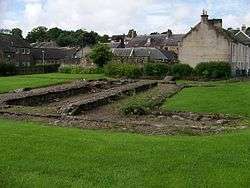 |
Tironensian monks — from Kelso dependent on Kelso; founded 1144, church and lands granted to Kelso by David I and John, Bishop of Glasgow; dissolved 1607 |
The Priory Church of Saint Malo, Lesmahagow | [88] 55°38′16″N 3°53′08″W / 55.6379041°N 3.8855124°W |
| Nunnery Priory | nuns of unspecified order — no foundation existed here | |||
Lothian
East Lothian
| Foundation | Image | Communities & provenance | Formal name or dedication & alternative names |
Online references & location |
|---|---|---|---|---|
| Dirleton Red Friars | Trinitarians chapel of St Andrew's founded by the ancestors of Patrick, Lord Haliburton; recorded as Trinitarian 1507; annexed to the Crown before 1 August 1588 |
[89] 56°02′14″N 2°47′18″W / 56.0372531°N 2.7882927°W | ||
| Dunbar Priory | Trinitarians founded 1240-8 (1218); granted to secular chaplain 8 March 1528/9; revoked 1 July 1529; dissolved 1529 |
The Priory Church of the Holy Trinity, Dunbar | [90] 56°00′05″N 2°31′05″W / 56.0014092°N 2.5180471°W | |
| Dunbar Whitefriars ? | Carmelite Friars purportedly founded 1263 by Patrick, Earl of March supposed foundation – foundation references spurious, later references possible confusion with Trinitarian house |
|||
| Elbottle Priory | Cistercian nuns cell of South Berwick; supposed foundation – evidence lacking |
|||
| Fidra Priory | Premonstratensian Canons supposed house island granted to Dryburgh by William de Vaux; canons of Dryburgh serving at the church of St Nicholas c.1220 described as a chantry c.1240 |
Elbottle Priory | [91] 56°04′24″N 2°47′07″W / 56.0732032°N 2.7852595°W | |
| Gullane Priory | Cistercian nuns cell of South Berwick; allegedly founded by David I; supposed foundation – evidence lacking |
Golyn Priory | ||
| Haddington Austin Friars | Augustinian Friars erroneous reference to Augustinian Canons of St Andrews | |||
| Haddington Austin Friars | Augustinian Friars hospital suppressed in favour of Austin Friars, and house built, though occupation never occurred and the house was conferred to Walter Ramsay, Chaplain to James V — incomplete foundation |
|||
| Haddington Blackfriars | Dominican Friars founded 1471; dissolved or secularised 1489 to after 1490; unsubstantiated claims of destroyed by the English and reduced to ashes 'by the rage of fanatics' c.1558[note 40] |
[92] 55°56′51″N 2°47′09″W / 55.9474937°N 2.7857852°W | ||
| Haddington Greyfriars | Franciscan Friars founded 1242; destroyed 1356 |
Lucerna Laudoniae or Lamp of Lothian | [93] 55°57′18″N 2°46′24″W / 55.9550746°N 2.7733612°W | |
| Haddington Priory | Cistercian nuns founded before 1159 by Ada, Countess of Northumberland and Huntingdon; dissolved or secularised 1621; erected into a temporal lordship for John Maitland, master of Lauderdale 1621 |
|||
| Houston Red Friars | Trinitarians founded c.1270 by Cristiana, widow of Sir Roger Mubray, (or purportedly c.1226 by Hugh, Lord of Houston[note 41]), confirmed 26 January 1271/2 by Alexander III; possibly adjunct to, or identical with Houston hospital; commonly (erroneously) located in Renfrewshire; dissolved 1531; annexed to Peebles, confirmed by charter 8 January 1541/2 |
The Grace of God | ||
| Luffness Red Friars | purported Trinitarians purportedly founded 1285 by an earl of Dunbar; confusion with Carmelite house at Fail | |||
| Luffness Whitefriars | Carmelite Friars founded before 1293; dissolved after 1560; leased by the Crown 4 January 1609 |
[94][95] 56°00′40″N 2°50′53″W / 56.0111733°N 2.8479749°W | ||
| Nunraw Abbey * | 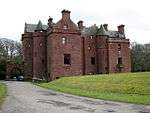 |
Cistercian monks — from Roscrea, Ireland; cell of Haddington; founded 1946 |
Sancta Maria Abbey, Nunraw | [96] 55°55′19″N 2°39′04″W / 55.9218085°N 2.651031°W |
| Nunraw Priory | supposed Cistercian nuns — no evidence of nunnery here | |||
| North Berwick Priory |  |
Cistercian nuns founded c.1150 by Duncan (I), Earl of Fife who granted land (also attributed to Malcolm, Earl of Fife); granted to Mariot Cockburn 30 June 1566; granted to Margaret Hume 7 August 1568; ruinous by 1587; dissolved or secularised 1587/8; resigned by Margaret Hume to Alexander Hume 20 March 1587/8: church and cloister site granted by James VI |
[97] 56°03′20″N 2°43′50″W / 56.055666°N 2.7305585°W | |
| Papple Priory | nuns of unspecified order land held by Cistercians of St Bothan's and Haddington — no evidence of monastic foundation | |||
| St Germains Preceptory | Knights Templar given as Templars' house,[note 42] actually a Bethlehemite Hospital | |||
| Trefontain Priory | Cistercian nuns cell of South Berwick; founded by David I; lands granted to the collegiate church of Douglass; supposed foundation |
Trefountain Priory; Trefontaynes Priory |
||
| Tyninghame Monastery | traditionally founded before 756 by Baldred; destroyed by the Norse 941 |
|||
West Lothian
| Foundation | Image | Communities & provenance | Formal name or dedication & alternative names |
Online references & location |
|---|---|---|---|---|
| Abercorn Monastery |  |
Celtic monks probably founded between 635 and 663; dissolved after early-8thC, (purportedly still extant 854) |
[98] 55°59′46″N 3°28′27″W / 55.996086°N 3.4742224°W | |
| Kirkliston Preceptory | Knights Hospitaller founded 1560; annexed to Torphichen soon before 31 March 1513 |
|||
| Linlithgow Austin Friars | Augustinian Friars royal benefactions between September and December 1503, no evidence of habitation – incomplete foundation; subsequent attempt to found settlement at Manuel (v. infra) |
|||
| Linlithgow Blackfriars | Dominican Blackfriars[note 43] foundation and founder unknown[note 44] |
|||
| Linlithgow Whitefriars | Carmelite Friars founded c.1401; dissolved before 1567/8 |
[99] 55°58′18″N 3°35′55″W / 55.9715888°N 3.5985267°W | ||
| Manuel Austin Friars | Augustinian Friars provision for suppression of Cistercian nunnery (see immediately below) by the Pope 16 June 1506, on petition by James IV, never implemented — incomplete foundation |
|||
| Manuel Priory | Cistercian nuns founded 1156 (before 1164) by Malcolm IV, confirmed by William the Lion between 1166 and 1171; dissolved or secularised after 1599; probably passed into the possession of Alexander, Lord Livingstone, for whom the lease was renewed by James VI 13 April 1599 |
Emanuel Nunnery; Manuel Nunnery |
[100] 55°58′10″N 3°38′57″W / 55.9695475°N 3.6490488°W | |
| Torphichen Preceptory + |  |
Knights Hospitaller founded between c.1144 and 1153 by David I who granted land; secularised 1563/4; land and baronies granted to praeceptor James, Lord St John by Queen Mary 25 January 1563/4 |
[101] 55°56′05″N 3°39′08″W / 55.9346427°N 3.6521628°W |
Midlothian
| Foundation | Image | Communities & provenance | Formal name or dedication & alternative names |
Online references & location |
|---|---|---|---|---|
| Balantrodoch Preceptory | Knights Templar founded 1128-53; suppressed c.1309 |
Temple | ||
| Newbattle Abbey |  |
Cistercian monks — from Melrose daughter of Melrose; founded 1140, regarded as by David I, endowments by David and his son, Earl Henry; dissolved 1560; granted to Mark Ker, son of the Commendator, also Mark Ker) 7 April 1567, confirmed 24 August 1584, after the death of his father; erected into a temporal lordship for Mark Ker (charter 1587) |
The Abbey Church of Saint Mary, Newbattle | [102] 55°52′49″N 3°04′13″W / 55.8803663°N 3.0703568°W |
| Soutra Red Friars | asserted Trinitarians — unfounded assertion |
Moray
| Foundation | Image | Communities & provenance | Formal name or dedication & alternative names |
Online references & location |
|---|---|---|---|---|
| Elgin Blackfriars | Dominican Friars founded 1233 or 1234 by King Alexander II; lands and revenues apparently permanently under Dunbar family at the Reformation; secularised 1570/1; Alexander Dunbar, dean of Moray received crown confirmation 7 January 1570/1, property granted under Great Seal 4 March 1573/4 and 9 January 1575/6 |
St James | [103] 57°38′58″N 3°19′21″W / 57.6494827°N 3.3224469°W | |
| Elgin Greyfriars | Franciscan Friars Minor, Conventual land granted by William, Earl of Ross c.1281; foundation incomplete |
[104] 57°38′55″N 3°18′37″W / 57.6486273°N 3.3103609°W | ||
| Elgin Greyfriars, Observants | Observant Franciscan Friars founded before 1494, allegedly by John Innes of Innes; dissolved or secularised c.1559; lands leased to Robert Innes of Invermarky by James VI 20 April 1573; restored; now in use by adjacent convent |
Observantine House of The Franciscan Friars | [105] 57°38′53″N 3°18′35″W / 57.6479499°N 3.3096313°W | |
| Elgin Whitefriars ? | Carmelite Friars probable confusion with Greyfriars |
|||
| Forres Blackfriars | supposed Dominican Friars[note 45] — evidence lacking | |||
| Kinloss Abbey | 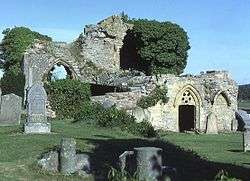 |
Cistercian monks — from Melrose daughter of Melrose; founded 21 May 1150 by David I; dissolved 1560; secularised 1601, erected into a temporal lordship for Edward Bruce, becoming Lord Kinross, (charters 1601, 1608) |
The Abbey Church of the Blessed Virgin Mary, Kinloss | [106] 57°38′02″N 3°33′59″W / 57.6339271°N 3.5665119°W |
| Pluscarden Abbey * |  |
Valliscaulian monks — from Val des Choux priory 1230; Benedictine monks dependent on Dunfermline; dissolved 1587, united with Urquhart; Benedictine monks priory, now Benedictine abbey |
The Abbey Church of Saint Andrew, Pluscarden | [107] 57°36′02″N 3°26′15″W / 57.6005539°N 3.4374547°W |
| Urquhart Priory # | Benedictine monks — from Dunfermline dependent on Dunfermline; founded 1124, reputedly by David I who made a grant made between 1130 and 1150; Pluscarden united with Urquhart; took formal possession of Pluscarden 8 November 1454; community settled at Pluscarden due to the extent of the buildings there; no remains on site, stone cross from priory incorporated into the wall of current parish church hall |
The Priory Church of the Holy Trinity, Urquhart | [108][109] 57°38′53″N 3°11′36″W / 57.6481164°N 3.1934381°W site 57°39′13″N 3°12′00″W / 57.6535994°N 3.1998907°W vestiges |
Orkney
| Foundation | Image | Communities & provenance | Formal name or dedication & alternative names |
Online references & location |
|---|---|---|---|---|
| Brough of Birsay Monastery | 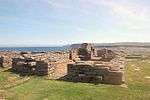 |
possible Celtic monks monastic settlement 6thC suggested to have connection with the name of St Colum or St Columba; Viking farmstead 9thC; cathedral early-12thC, foundation unknown; see translated to Kirkwall 12thC; church probably in parochial use until 13thC; episcopal residence in use to 14thC |
St Peter's Monastery | [110] 59°08′12″N 3°19′49″W / 59.136571°N 3.3301824°W |
| Brough of Birsay Red Friars | alleged Trinitarians[note 46] — order unconfirmed | |||
| Eynhallow Monastery # |  |
possible site of monastic settlement 12thC; evidently ceased well before 16thC |
[111] 59°08′29″N 3°07′19″W / 59.1412545°N 3.1218123°W | |
| Golgotha Monastery *, Papa Stronsay | Transalpine Redemptorists transferred from Joinville, France; island purchased 31 May 1999; extant |
[112][113] 59°08′56″N 2°35′18″W / 59.1488162°N 2.588262°W | ||
| Hichaten Priory | Cistercian monks supposed foundation — no such location identified in the Orkneys |
Hichaten vel Orcades | ||
| Papa Stronsay Monastery | possible Papari or Pictish monks founded 8thC? |
[114] 59°08′53″N 2°34′45″W / 59.1480757°N 2.5793016°W |
Perth & Kinross Region
| Foundation | Image | Communities & provenance | Formal name or dedication & alternative names |
Online references & location |
|---|---|---|---|---|
| Abernethy Priory | 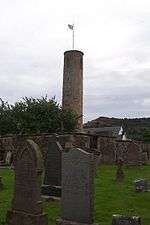 |
Culdees founded c.6thC by Nechtan, King of the Picts; possible cathedral; Augustinian Canons Regular founded 1272 or 1273; dissolved or secularised early 14thC, erroneously attributed to George, Earl of Angus c.1450; secular canons collegiate founded |
The Priory Church of Saint Mary, Saint Bridget and Saint Abrinca St Bride |
[115][116] 56°20′00″N 3°18′43″W / 56.3333603°N 3.3118629°W |
| Aberuthven 'Cell' | church granted to the 'brethren' at Inchafray c.1198; asserted cell of Inchafray granted to the Augustinian Canons Regular at Inchafray c.1200; remained a parochial church rather than a cell |
56°19′02″N 3°39′40″W / 56.3171734°N 3.6611402°W | ||
| Coupar Angus Abbey |  |
Cistercian monks — from Melrose founded 1161/64, planned by Malcolm IV on the advice of Waltheof of Melrose; abbot appointed 12 July 1164; dissolved 1560; granted to Andrew Lamb 24 March 1603; granted to Patrick Sterling 20 May 1607; secularised 1606; erected into a temporal lordship for James Elphinstone, thereafter Lord Coupar; Lamb resigned the claim 24 January 1607 |
The Abbey Church of The Blessed Virgin Mary, Coupar Angus | [117][118] 56°32′39″N 3°15′59″W / 56.5440363°N 3.2664156°W |
| Coupar Angus Blackfriars | Dominican Friars[note 47] founded c.1480, probably by Thomas, commendator-abbot of Coupar and dean of Dunkeld[note 48] |
|||
| Dalvey Cell | Valliscaulian monks supposed cell dependent on Pluscarden; evidence lacking — considered conjectural |
|||
| Dron Priory | Cistercian monks supposed foundation purportedly dependent on Coupar Angus — dubious |
56°27′26″N 3°07′24″W / 56.4572°N 3.1233°W | ||
| Dull Priory | suggested house of Tironensian monks, references apparently erroneous | |||
| Dunblane Monastery | 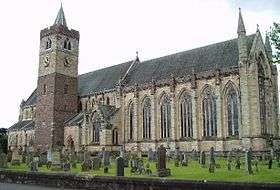 |
early foundation, possible Culdees — unsubstantiated; cathedral founded before 1214-1223 |
[119][120] 56°11′22″N 3°57′54″W / 56.1894902°N 3.9650345°W | |
| Dunkeld Monastery |  |
built before 849 by Kenneth mac Alpin | [121] 56°33′54″N 3°35′23″W / 56.56500°N 3.58972°W | |
| Elcho Priory | Cistercian nuns founded before 1241, attributed to David Lindsay I; dissolved or secularised 1610; erected into a temporal lordship for Lord Scone (later Viscount Stormont) |
Elcho Nunnery; Orchardnook |
[122] 56°22′49″N 3°23′31″W / 56.380297°N 3.391964°W | |
| Forfar Abbey | Cistercian monks — erroneous reference to Coupar Angus | |||
| Forfar Greyfriars | supposed Franciscan Friars Minor, Conventual erroneous reference[note 49] |
|||
| Inchaffray Abbey | 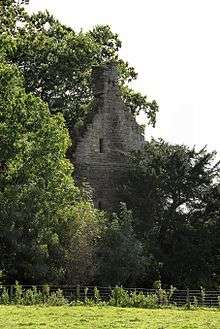 |
community of brethren foundation unknown; Augustinian Canons Regular priory founded (c.)1200 by Gilbert, Earl of Strathearn, granted to Scone; raised to abbey status 1220 or 1221; dissolved or secularised 1609-69, erected into temporal lordship 31 January 1609, established 15 February 1669 |
The Abbey Church of Saint John the Evangelist and Saint Mary, Inchaffray | [123] 56°23′00″N 3°41′45″W / 56.383273°N 3.6959204°W |
| Kinkell 'Cell' | Augustinian Canons Regular asserted cell of Inchaffray; actually parochial church | |||
| Kinkell Commandery | Knights Hospitaller — traditional – no evidence | |||
| Loch Tay Priory | Augustinian Canons Regular — from Scone uncertain foundation; island granted to Scone by Alexander I 1122 |
The Priory Church of Saint Mary, Loch Tay | [124] 56°35′02″N 4°00′37″W / 56.5839458°N 4.0103316°W | |
| Methven Monastery | secular priests founded between 1214 and 1223? |
|||
| Montrose Blackfriars | Dominican Friars founded 1230, purportedly by Sir Alan Durward; apparently abandoned after being destroyed 14thC; secularised 1570/1, revenues granted to the Burgh of Montrose by James VI 1 January 1570/1 |
The Nativity of the Blessed Virgin Mary ____________________ Blackfriars Hospital |
[125] 56°42′48″N 2°28′38″W / 56.7132802°N 2.4773097°W | |
| Muthill Monastery | Culdees founded between 1178 and 1195; dissolved by 1236 |
|||
| Perth Blackfriars | Dominican Friars founded before 1240, (purportedly 1231) by Alexander II; secularised 1569, lands and revenues granted to the Burgh of Perth by James VI 9 August 1569 |
St Andrew | [126] 56°23′55″N 3°25′51″W / 56.398719°N 3.4308532°W | |
| Perth Greyfriars | Observant Franciscan Friars founded before 1496, purported (spurious) papal bull of Pius II 26 July 1460 confirming building by Sir Laurence of Oliphant of Aberdelgie; (erroneous reference to 1358 foundation is evidently the Blackfriars' house) dissolved or secularised 1559-60, destroyed by Reformers 1559; site became a cemetery 1580 |
|||
| Perth Priory | Carthusian monks founded 1429, proposed by James I, authorised by the Prior of Grande Chartreuse 19 August 1426, consent of the General Chapter, ; dissolved or secularised 1569; possession passed to the Town Council 1602 |
Vale of Virtue Priory | [127] 56°23′25″N 3°26′22″W / 56.3902142°N 3.4393558°W | |
| Perth, St Leonard's Priory | Augustinian Canonesses founded 13thC; annexed to Perth Charterhouse (see immediately above) c.1434 |
St Leonard ____________________ St Leonard's Priory and Hospital |
[128] 56°23′26″N 3°26′22″W / 56.390439°N 3.4393645°W | |
| Rindalgros Monastery ? | Benedictine monks dependent on Reading, Berkshire; founded 1147-53(?), granted to Reading by David I; monastic community located here, though possibly no monastery was built either transferred to Isle of May before 1151 or merged with Isle of May after 1151; held by Isle of May 1231 |
Rhynd Monastery; Rindelgros Monastery |
[129] 56°21′52″N 3°22′25″W / 56.3645132°N 3.3736181°W | |
| St Fillan's Priory | 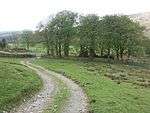 |
Augustinian Canons Regular — from Inchaffray founded 1317, land granted patronage of church of Killin to Inchafray by Robert I 26 February 1317/8; granted to Campbell of Glenorchy; revenues apparently granted to Archibald Campbell of Glencarradale by the Crown 19 March 1607 |
The Priory Church of Saint Fillan, St Fillan's ____________________ Strathfillan Priory; Strath Fillan Priory |
[130] 56°25′09″N 4°39′42″W / 56.4191892°N 4.661639°W |
| St Serf's Inch Priory, St Serf's Inch, Loch Leven | Culdees founded before 842, traditionally by Brude mac Dergard, King of the Picts – more likely by Brude mac Ferat; Augustinian Canons Regular dependent on St Andrews; founded 1152/3 (c.1150); dissolved or secularised 1580; now within an island nature reserve usually without public access; (HS) |
Portmoak Priory; Portmoakso Priory; Loch Leven Priory; St Serf's Priory; St Serf's Island Priory |
[131] 56°11′15″N 3°21′09″W / 56.187532°N 3.3524609°W | |
| Scone Abbey | Culdees or Columban monks evidence lacking; Augustinian Canons Regular — from Nostell (?re)founded c.1120 purportedly by Alexander I |
The Abbey Church of the Holy Trinity, The Blessed Virgin Mary, Saint Laurence, Saint Augustine and Saint Michael, Scone | [132] 56°25′22″N 3°25′56″W / 56.4226961°N 3.4320903°W | |
| Scotlandwell Red Friars | originally hospital of St Mary; Trinitarians granted by David de Bernham, Bishop of St Andrews 2 January 1250/1; secularised before 1591/2 |
[133] 56°11′58″N 3°18′44″W / 56.1994528°N 3.3123565°W | ||
| Tullilum Whitefriars | Carmelite Friars founded 1262, chapel granted by Richard, Bishop of Dunkeld; dissolved or secularised after 1559; purportedly destroyed by Reformers 1559; granted to Patrick Murray of Tibbermore, confirmed by the Crown 23 June 1565[note 50] |
Perth Whitefriars; Tulliburn Whitefriars The White Chapel (nave) |
[134] 56°23′53″N 3°26′44″W / 56.3980407°N 3.4456026°W | |
Renfrewshire
| Foundation | Image | Communities & provenance | Formal name or dedication & alternative names |
Online references & location |
|---|---|---|---|---|
| Inchinnan Monastery | traditionally a monastic settlement | |||
| Inchinnan 'Preceptory' | Knights Templar no house – parochial church held by the Templars, and later the Hospitallers; North Bar House on site |
[135] 55°53′33″N 4°25′51″W / 55.8925006°N 4.4307342°W | ||
| Paisley Abbey + | 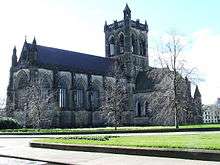 |
Cluniac monks — from Wenlock, Shropshire priory founded c.1169 (1163); raised to abbey status 1219 (1245); dissolved 1587; (CS) |
The Abbey Church of saints Mary, James, Mirin and Milburga | [136][137] 55°50′42″N 4°25′13″W / 55.8448677°N 4.4203448°W |
| Renfrew Priory | Cluniac monks — from Cluny founded c.1163; dissolved between 1169 and 1173 |
[138] 55°52′23″N 4°22′53″W / 55.8731801°N 4.3812758°W | ||
Scottish Borders
| Foundation | Image | Communities & provenance | Formal name or dedication & alternative names |
Online references & location |
|---|---|---|---|---|
| Ancrum Preceptory | Knights Hospitaller purported preceptory or hospital - conjectural (secular foundation at Ancrum Spittal) |
|||
| Ancrum Red Friars | Trinitarians supposed house[note 51] — evidence lacking |
|||
| Berwick Austin Friars | Formerly located in Scotland. See entry under List of monastic houses in Northumberland | |||
| Berwick Blackfriars | Formerly located in Scotland. See entry under List of monastic houses in Northumberland | |||
| Berwick Greyfriars | Formerly located in Scotland. See entry under List of monastic houses in Northumberland | |||
| Berwick Priory | Formerly located in Scotland. See entry under List of monastic houses in Northumberland | |||
| Berwick Red Friars | Formerly located in Scotland. See entry under List of monastic houses in Northumberland | |||
| Berwick Friars of the Sack | Formerly located in Scotland. See entry under List of monastic houses in Northumberland | |||
| Berwick Whitefriars | Formerly located in Scotland. See entry under List of monastic houses in Northumberland | |||
| Charterhouse | Carthusian monks no evidence of monastic house – probable interpretation of reference to Perth Charterhouse | |||
| Coldingham Priory + |  |
monks and nuns double house; founded before 661 and 664 by Ebba, daughter of King Æthelfrith of Northumbria; damaged by fire c.683, and abandoned by most of the community; nuns dependent on Lindisfarne before 854; destroyed in raids by the Danes c.870; Benedictine monks dependent on Durham; shire granted to Durham by King Edgar c.1098; founded before 1139; dependent on Dunfermline 14th-15thC; monks evicted 1532, 1542 and 1544/5; destroyed in warfare by 4 February 1551/2; dissolved 1606; most of remaining buildings destroyed by Cromwell 1648; part of conventual church restored; now in parochial use |
The Priory Church of Saint Mary, Saint Ebba and Saint Cuthbert, Coldingham | [139] 55°53′11″N 2°09′18″W / 55.8864591°N 2.1550852°W |
| Coldstream Priory | Cistercian nuns founded before 1166 by Earl Gospatrick; dissolved or secularised 1621, erected into a temporal lordship for Sir John Hamilton of Trabroun |
|||
| Crail Priory | nuns — apocryphal establishment | |||
| Eccles Priory | Cistercian nuns purportedly founded 1156 (or 1145 or 1155), attributed to Earl Gospatrick, or a countess of March (possibly Derdere, wife of Earl Gospatrick); dissolved or secularised 1609; erected into a temporal lordship of Sir George Hume 24 June 1609 |
|||
| Dryburgh Abbey | 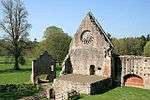 |
Premonstratensian Canons — from Alnwick daughter of Alnwick; founded 1150; dissolved or secularised 1606; (HS) |
The Abbey Church of Saint Mary, Dryburgh | [140] 55°34′38″N 2°38′58″W / 55.5772803°N 2.6494968°W |
| Fogo Priory | 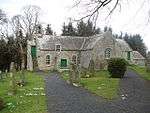 |
Tironensian monks — from Kelso dependent on Kelso; founded between 1259 and 1297, church of St Nicholas granted to Kelso by Patrick Corbet; dissolution unknown |
[141] 55°44′08″N 2°21′50″W / 55.7356402°N 2.3637611°W | |
| Jedburgh Abbey | 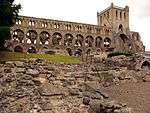 |
land granted by Ecgred, Bishop of Lindisfarne c.830; Augustinian Canons Regular — apparently from St-Quentin, Beauvais priory founded c.1138 (1148) by David I with the assistance of John, Bishop of Glasgow; erroneously referred to as Cluniac in one manuscript; raised to abbey status c.1154; dissolved or secularised 1696; (HS) |
The Abbey Church of Saint Mary, Jedburgh | [142] 55°28′36″N 2°33′17″W / 55.4766524°N 2.5546753°W |
| Jedburgh Blackfriars | locally but inaccurately cited Dominican Friars[note 52][note 53] | [143][144] 55°28′48″N 2°33′12″W / 55.479933°N 2.553400°W | ||
| Jedburgh Greyfriars | Observant Franciscan Friars founded before 1505; allegedly built 1513 by the nobles of the Border; dissolved or secularised unknown |
|||
| Kelso Abbey |  |
Tironensian monks (community founded at Selkirk c.1113); transferred from Selkirk in 1128; dissolved or secularised 1607; (HS) |
The Abbey Church of Saint Mary and Saint John, Kelso | [145] 55°35′50″N 2°25′57″W / 55.5972259°N 2.4325168°W |
| Makerstoun Charterhouse | Carthusian monks land granted to the Carthusians at Perth by Archibald, Earl of Douglas 2 February 1433/4; no evidence of monastic foundation |
|||
| Melrose Abbey | 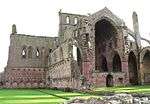 |
Cistercian monks — from Rievaulx/Holmcultram founded 1136/7 by David I; dissolved 1598; bestowed on James Stewart, Commendator of Kelso; secularised 1609, erected into a temporal lordship for John Ramsay, Viscount Haddington, becoming Lord Melrose; (HS) |
The Abbey Church of Saint Mary and Saint John, Melrose | [146] 55°35′57″N 2°43′05″W / 55.5991019°N 2.7180272°W |
| Old Melrose Monastery | Celtic monks possibly from Iona founded between 635 and 651; destroyed by Kenneth mac Alpin 839; under the bishops of Lindisfarne until 854; attempted refoundation by Aldwin of Jarrow; abandoned 1074; church of St Cuthbert founded; dependent on Durham until between 1124 and 1136; exchanged for the church at Berwick by King David I between 1124 and 1136; annexed to Cistercian monastery at Melrose |
St Cuthbert's Chapel | [147] 55°35′52″N 2°39′20″W / 55.5977199°N 2.6554406°W | |
| Peebles Red Friars |  |
Trinitarians church built after 9 May 1261, when cross of purported relics of 'St Nicholas the bishop' was found, motivating Alexander III to build a church; founded before 1296, when the master swore fealty to Edward I; friary apparently founded c.1448 with the approval of the bailies; bailies claim to have expelled friars c.1463, authorised by the Pope 21 April 1463; expulsion apparently not effected; new foundation consented by petition of James III and his queen, 3 February 1473/4; dissolved or secularised 1560/1; lands erected to barony for John Hay of Yester 3 February 1624; church in use until 1784 |
The Friary Church of the Holy Trinity, Peebles ____________________ The Cross Kirk; Holy Cross |
[148] 55°39′15″N 3°11′33″W / 55.6542387°N 3.1924832°W |
| Roxburgh Greyfriars | Franciscan Friars Minor, Conventual founded 1232 or 1232-4 by Alexander II;[note 54] destroyed: burned by the English 14 September 1454[note 55] dissolved or secularised after 1547, evidently; partly re-roofed November 1547 and in use for English troops |
[149] 55°35′46″N 2°26′44″W / 55.5962496°N 2.4454495°W | ||
| Roxburgh Priory | purported Augustinian Canons Regular — probable confusion with Fransciscan friary | |||
| Roxburgh Priory | Cistercian monks — unfounded assertion;[note 56] church of St James held by Kelso, the settlement of monks, or of Cistercians, is unsubstantiated | |||
| St Bothan's Priory, Abbey St Bathans |
Cistercian nuns founded 13thC (possibly during the reign of William the Lion) possibly by a countess of March, or by Ada, daughter of William the Lion, or Christina, wife of Earl Patrick, or Euphemia, wife of Patrick, Earl of Dunbar; leased to Alexander, Lord Home 16 June 1565/6; conferred on Elizabeth Hume 8 March 1565/6, demitted before 23 July 1617; granted to David Lindsay 23 July 1617; dissolved or secularised 1622, erected into a temporal lordship for David Lindsay |
St Bathan's Priory | [150][151][152][153] 55°51′11″N 2°23′14″W / 55.8530937°N 2.3872934°W | |
| Selkirk Abbey | Tironensian monks — from Tiron founded c.1113 by Earl David; transferred to Kelso c.1128 |
[154] | ||
| Selkirk Blackfriars | Dominican Blackfriars[note 57] charter of James Tweedie of Drumelzier, 28 September 1358, granted site to build a new monastery on instruction of King David II[note 58] — evidence lacking |
St Ninian | ||
The following location in the Scottish Borders has no known monastic connection:
- Abbey: placename probably does not pre-date 1726
Stirling Region
| Foundation | Image | Communities & provenance | Formal name or dedication & alternative names |
Online references & location |
|---|---|---|---|---|
| Cambuskenneth Abbey |  |
Augustinian Canons Regular — Arroasian — from Arroaise founded 1147; (HS) |
The Abbey Church of Saint Mary, Cambuskenneth | [155] 56°07′24″N 3°55′03″W / 56.1233031°N 3.917495°W |
| Inchcailleoch Priory | nuns of unspecified order - traditional (assumed from the name of the island - purportedly "the island of old women"), parochial church — no evidence of monastic foundation | |||
| Inchmahome Priory, Lake of Menteith |  |
Augustinian Canons Regular independent priory founded 1238 by Walter, Earl of Menteith; dissolved or secularised 1604; erected into temporal lordshhip for John Erskine, Second Earl of Mar 1604 and 1606; (HS) |
[156] 56°10′35″N 4°17′53″W / 56.176342°N 4.2979181°W | |
| Stirling Blackfriars | Dominican Friars founded before 1249 by Alexander II; purportedly destroyed by Reformers June 1559; putatively granted to Alexander Erskine of Cangnoir May 1560; secularised 1567, granted to the municipality of Stirling by Queen Mary 15 April 1567, though Erskine retained possession until 1652 |
St Laurence | [157][158] 56°07′10″N 3°56′12″W / 56.11944°N 3.93667°W | |
| Stirling Greyfriars | Observant Franciscan Friars founded 1494, allegedly by James IV; dissolved or secularised 1559-67; destroyed by Reformers 1559; granted to the magistrates 15 April 1567 |
The following location in the Stirling Region has no monastic connection:
- Ross Priory: mansion named 'Ross', renamed 'Ross Priory' 1810
Unidentified supposed foundations
| Foundation | Image | Communities & provenance | Formal name or dedication & alternative names |
Online references & location |
|---|---|---|---|---|
| Ancaria | Cistercian monks, mentioned 1530 | |||
| Crenach Red Friars | supposed Trinitarians, located in Cromarty (Highland Region), purportedly founded c.1271 by Patrick Murray; possibly indicates Greenock, Renfrewshire (or Greenock, East Ayrshire), or Carnwath, Lanarkshire — no monastic house at those locations – probably fictitious |
Crennach; Crenwathe |
||
| Crusay | Augustinian Canons Regular, alleged foundation in the Western Isles, possible misreading of Oronsay | |||
| Molista | nuns of unspecified order — suggested site of a house on the basis of the name: "the town (or house) of the black old women" | |||
| Oggerstone Preceptory | Knights Templar given as fort and barony of Templars[note 59] — actual reference to Ogerstone, Huntingdon, England (see List of monastic houses in Cambridgeshire) |
|||
| unlocated | Carthusian monks, petition by Archibald, Earl of Douglas, granted by the Pope 5 June 1419 supplication for license to found a house; projected foundation never implemented |
Glossary
See also
Notes
- ↑ Aberdeen Red Friars — foundation date 1181 given by Father R. A. Hay, Scotia Sacre (MS.34.1.18 in the National Library of Scotland), p.70
- ↑ Banff Greyfriars — Collections for a History of the Shires of Aberdeen and Banff (Spalding Club, 1843), p.205
- ↑ Forvie Preceptory: Collections for a History of the Shires of Aberdeen and Banff (Spalding Club, 1843), p.217
- ↑ Tullich Preceptory — J. Spottiswoode, An account of all the Religious Houses that were in Scotland at the time of the Reformation (included in R. Keith, An Historical Catalogue of the Scottish Bishops (Edinburgh, 1824)), p.435
- ↑ Tullich Preceptory — Templaria: Papers relative to the history, privileges and possessions of the Scottish Knights Templars, and their successors the Knights of St. John of Jerusalem (1828), pp.5,7; Abstracts of charters and other papers recorded in the chartulary of Torphichen from 1581 to 1596 (Edinburgh, 1830), p.9
- ↑ Barry Red Friars – Father R. A. Hay, Diplomatum Veterum Collectio. (MS. 34-1.10 in the National Library of Scotland), iii, p.573
- ↑ Brechin Red Friars – Father R. A. Hay, Diplomatum Veterum Collectio. (MS. 34-1.10 in the National Library of Scotland), iii, p.579
- ↑ Brechin Red Friars – Manuscript collections of Father Marianus Brockie (Scottish Catholic Archives, Edinburgh), p.1081
- ↑ Dundee Greyfriars — foundation: Joannis de Fordun Scotichronicon cum Supplementis et Continuatione Walteri Boweri, ed. Goodall (Edinburgh, 1759): lib. viii, cap. xxv; ibid, i, 474; J. Spottiswoode, An account of all the Religious Houses that were in Scotland at the time of the Reformation (included in R. Keith, An Historical Catalogue of the Scottish Bishops (Edinburgh, 1824)), p.489
- ↑ Dundee Greyfriars — date of building: Documents Illustrative of the History of Scotland 1286-1306, ed. J. Stevenson (Edinburgh, 1870), ii, no.484
- ↑ Iona Abbey — Tironensian: conjectured by W. F. Skene, Celtic Scotland, Edinburgh (1867)
- ↑ Rothesay Abbey: Ecclesiastical Architecture, iii, p.418
- ↑ Texa Cell — Joannis de Fordun Scotichronicon cum Supplementis et Continuatione Walteri Boweri, ed. Goodall (Edinburgh, 1759) lib. ii, cap x; i. p.45
- ↑ Dercongal Abbey — Manuscript 33.2.12, National Library of Scotland, gives founder as Devorgilla, daughter of Alan of Galloway; evidently a confusion with Sweetheart Abbey
- ↑ Dumfries Blackfriars — Manuscript 22.1.14, 153 f., National Library of Scotland
- ↑ Dumfries Blackfriars — erroneous entry in J. Spottiswoode, History of the Church of Scotland (1677 Ed.) Appendix, p.16 (25)
- ↑ Dumfries Blackfriars — erroneous reference to Friars Preachers (correctly Friars Minor) in Dumfries list (NX 9776), 1 May 1579 (Registrum Magni Sigilli Scotorum, iv, no.32)
- ↑ Dumfries Greyfriars — probably spurious charter of foundation 20 April 1234 by Alan of Galloway cited by Manuscript collections of Father Marianus Brockie (Scottish Catholic Archives, Edinburgh), p.1268
- ↑ Dumfries Greyfriars — foundation date c.1262 cited by W. Moir Bryce, The Scottish Grey Friars (Edinburgh, 1909), i, p.199
- ↑ Dumfries Greyfriars — foundation date before 1305 cited Early Sources of Scottish History 500 to 1268, ed. A. O. Anderson (Edinburgh, 1922) ii, p.479n
- ↑ Dumfries Greyfriars — possession by Town Council cited by W. Moir Bryce, The Scottish Grey Friars (Edinburgh, 1909), i, p.214
- ↑ Kirkcudbright Blackfriars — Rotuli scaccarii regum scotorum (The Exchequer Rolls of Scotland), ed. J. Stewart and others (Edinburgh, 1878-1908) xiii, p.472: reference 1512 to Friars Preachers of Kirkcudbright
- ↑ Kirkcudbright Greyfriars — spurious charter 16 September 1239: Tweedie Manuscript, cited by Manuscript collections of Father Marianus Brockie (Scottish Catholic Archives, Edinburgh), pp.1431-2
- ↑ Edinburgh Preceptory: Reports of the Royal Commission on Ancient and Historical Monuments and Constructions of Scotland — Edinburgh (1951), p.126, no.75: exaggerated description of property
- ↑ Queensferry Whitefriars — foundation 1330/1: J. Spottiswoode, An account of all the Religious Houses that were in Scotland at the time of the Reformation (included in R. Keith, An Historical Catalogue of the Scottish Bishops (Edinburgh, 1824)), p.455
- ↑ Queensferry Whitefriars — foundation intimated: purported letter of James Dundas, Laird of Dundas, to the Provincial and Vicar-General of the Camelite order in Scotland — Manuscript collections of Father Marianus Brockie (Scottish Catholic Archives, Edinburgh), p.1554
- ↑ Queensferry Whitefriars — present parish church: Dundas Charters, National Library of Scotland, Mac. xxiv, p.29)
- ↑ Nuntown Priory — New Statistical Account
- ↑ Crail Blackfriars — spurious and unreliable charters cited by Manuscript collections of Father Marianus Brockie (Scottish Catholic Archives, Edinburgh), pp.1254, 1255-7
- ↑ Dysart Blackfriars — included in Dumfries list
- ↑ Dysart Blackfriars — Manuscript collections of Father Marianus Brockie (Scottish Catholic Archives, Edinburgh), p.1229 - land granted: spurious charter of William Sinclair of Dysart 27 March 1466/7/8 (year partly obscured)
- ↑ Inverkeithing Blackfriars — included in Dumfries list and W. Maitland, The History and Antiquities of Scotland (London, 1757), i 262
- ↑ Inverkeithing Blackfriars — site granted: Manuscript collections of Father Marianus Brockie (Scottish Catholic Archives, Edinburgh), p.1224 - charter (undated) "Hugh de Lundey", Lord of the Burgh of Inverkeithing with the consent of Robert de Bruis index Accounts of the Lord High Treasurer of Scotland, edited by T. Dickson and Sir J. Balfour Paul (Edinburgh 1877-1916), ii (though the text refers to 'Frieris of Inverkethin' (most likely the Franciscan Friars)
- ↑ Isle of May Monastery: Annals of the Reigns of Malcolm and William, Kings of Scotland, ed. A. C. Lawrie (Glasgow, 1910) states "It is possible that on the Isle of May, in the beginning of the twelfth century, there was a small fraternity of culdees or monks of the old Scottish church"
- ↑ Kinghorn Blackfriars — included in Dumfries list
- ↑ Kinghorn Blackfriars — spurious and unreliable charters cited by Manuscript collections of Father Marianus Brockie (Scottish Catholic Archives, Edinburgh), pp.1228: vague account of foundation - probably spurious charter of benefaction of James de Kirkcaldy 28 September 1388
- 1 2 St Ninian's Blackfriars — Extracta e Variis Cronicis Scocie (Abbotsford Club 1842) p.249
- ↑ Lanark Greyfriars — foundation 1328-9: spurious charter of foundation cited by Manuscript collections of Father Marianus Brockie (Scottish Catholic Archives, Edinburgh), p.1459
- ↑ Lanark Greyfriars — W. Moir Bryce, The Scottish Grey Friars (Edinburgh, 1909), ii, p.149; Reg, Aven, 88, folios 191-IV
- ↑ Haddington Blackfriars — destruction: Manuscript collections of Father Marianus Brockie (Scottish Catholic Archives, Edinburgh), p.1236
- ↑ Houston Red Friars — foundation date (c.)1220 given by Father R. A. Hay, Diplomatum Veterum Collectio. (MS. 34-1.10 in the National Library of Scotland), iii, p.576; J. Spottiswoode, An account of all the Religious Houses that were in Scotland at the time of the Reformation p.396 (included in R. Keith, An Historical Catalogue of the Scottish Bishops, Edinburgh, 1824)), who located the foundation in Renfrewshire
- ↑ St Germains Preceptory — J. Spottiswoode, An account of all the Religious Houses that were in Scotland at the time of the Reformation (included in R. Keith, An Historical Catalogue of the Scottish Bishops (Edinburgh, 1824)), p.435
- ↑ included in Dumfries list
- ↑ Linlithgow Blackfriars — Manuscript collections of Father Marianus Brockie (Scottish Catholic Archives, Edinburgh), p.1219 – probably spurious charter of John, King of Scots 19 March 1294/5
- ↑ Forres Blackfriars — included in Dumfries list
- ↑ 'Brough of Birsay Red Friars': Reports of the Royal Commission on Ancient and Historical Monuments and Constructions of Scotland, Orkney and Shetlands (Edinburgh, 1909-), ii, I, p.3
- ↑ Coupar Angus Blackfriars — listed by J. Spottiswoode, History of the Church of Scotland (1677), p.16 (25)
- ↑ Coupar Angus Blackfriars — foundation: foundation date and founder unknown: Manuscript collections of Father Marianus Brockie, Scottish Catholic Archives, Edinburgh, suggested founder (p.1241), suggested date (p.1248)
- ↑ Forfar Greyfriars — Calendar of Documents relating to Scotland, ed. J. Bain, (Edinburgh, 1881-8), (ii, no. 856) includes reference to such a house; Documents Illustrative of the History of Scotland 1286-1306, ed. J. Stevenson (Edinburgh, 1870), (ii, no. cccclxxxiv, 23 November 1297) shows this to be erroneous
- ↑ Tullilum Whitefriars — Registrum Secreti Sigilli Regnum Scotorum, ed. M. Livingstone and others (Edinburgh, 1908— ), V, no.2124
- ↑ Ancrum Red Friars — Geographical Collections relating to Scotland made by Walter Macfarlane (SHS, 1906-08), iii, p.158
- ↑ Jedburgh Blackfriars — included in Dumfries lists
- ↑ Jedburgh Blackfriars — Watson, History of the Franciscan Friary of Jedburgh, HNBC, 1906, p.82
- ↑ Roxburgh Greyfriars — foundation: probably spurious charter of foundation 18 October 1232 cited by Manuscript collections of Father Marianus Brockie (Scottish Catholic Archives, Edinburgh), pp.1281-2
- ↑ Roxburgh Greyfriars — destruction: Letters and Papers, foreign and domestic of the reign of Henry VIII ed. by J. S. Brewer and others (London, 1864-1932), xx2 no. 456, 533
- ↑ Roxburgh — A. O. Anderson, Early Sources, ii, p.183, note, according to papal legate declaration, and referring to exemption of the church of St James, synodal and episcopal aids: 'It seems therefore to have been occupied by Cistercian monks at this time'
- ↑ Selkirk Blackfriars — included in Dumfries lists
- ↑ Selkirk Blackfriars — charter of dubious merit (purportedly bearing the seal of Alexander Maxwell, Archdeacon of 'Tuuedaliae' — if Tweedale: no such archdeaconry, if Teviotdale: no record of archdeacon of that name) cited by Manuscript collections of Father Marianus Brockie (Scottish Catholic Archives, Edinburgh), p.1242
- ↑ Oggerstone Preceptory — J. Spottiswoode, An account of all the Religious Houses that were in Scotland at the time of the Reformation (included in R. Keith, An Historical Catalogue of the Scottish Bishops (Edinburgh, 1824)), p.435
Footnotes
- ↑ Site Record for Aberdeen, Greyfriars Church Marischal College; Grey Friar's Monastery; Aberdeen, Franciscan Friary Details
- ↑ Site Record for Aberdeen, Trinitarian Monastery Trinity Friars' Monastery Details
- ↑ Site Record for Aberdeen, Carmelite Friary 12 St Martin's Lane; 2-12 Rennie's Wynd; The Green; Carmelite Monastery Details
- ↑ Site Record for Duff House, Mausoleum And St Mary's Well Carmelite Monastery; Our Lady Chapel; St Mary's Chapel; Duff House Estate; Duff House Policies Details
- ↑ Site Record for Clova, St Luke's Chapel And Well Sammiluak's Chapel; Monastery Of Clovett Details
- ↑ Site Record for Deer Abbey Old Deer Abbey; Cistercian Abbey Of Deer Details
- ↑ Site Record for Fyvie, Priory And Priory Cross Fivue Priory; Fyvie Priory Cross Details
- ↑ Site Record for Monymusk Priory Priory Of Monymusk Details
- ↑ Monymusk.com - History Index : The Priory
- ↑ Site Record for Turriff, 'Celtic Monastery' Details
- ↑ Site Record for Arbroath Abbey, Conventual Building Details
- ↑ Site Record for Brechin Cathedral Brechin Parish Church; Brechin Round Tower; Round Tower, Brechin; Cathedral Of The See Of Brechin Details
- ↑ Site Record for Dundee, Barrack Street, Dominican Monastery Details
- ↑ Site Record for Dundee, The Houff, Franciscan Friary Greyfriars' Monastery Details
- ↑ Site Record for Dundee, Monifieth, St Regulus' Church And Burial-Ground Details
- ↑ Site Record for Restenneth Priory Strathmore Estate Details
- ↑ Site Record for Ardchattan Priory Ardchattan Priory Church; Ardchattan House Details
- ↑ Site Record for Cara, St Fionnlugh's Chapel St Finla's Digital_images
- ↑ Site Record for Kilneuair, St Columba's Church And Churchyard St Columba's Chapel Details
- ↑ Site Record for Iona, Iona Abbey Iona, St Mary's Cathedral; St Mary's Abbey Details
- ↑ Site Record for Bute, St Blane's Church Kingarth; Saint Mary's Chapel, Saint Blane's Chapel Details
- ↑ Site Record for Oronsay Priory Details
- ↑ Site Record for Saddell Abbey Cistercian Saddell Abbey; Saddell Water; Allt Nam Manach Details
- ↑ Site Record for Tiree Details
- ↑ Site Record for Tiree Details
- ↑ Historical perspective for Mauchline
- ↑ Site Record for Irvine, Fullarton Details
- ↑ Site Record for Kilwinning Abbey Details
- ↑ Kilwinning Abbey, Kilwinning
- ↑ Ruin of Old Abbey Southannan, Fairlie - West Kilbride - North Ayrshire - Scotland | British Listed Buildings
- ↑ Site Record for Ayr, Kirk Port, Auld Kirk Of Ayr Kirkport, Old Parish Church; Church Of Scotland Details
- ↑ Site Record for Crossraguel Abbey Crossraguel; Corsregal, St Mary's Abbey Details
- ↑ Historic Scotland - Crossraguel Abbey Property Detail
- ↑ Crossraguel Abbey
- ↑ Crossraguel Abbey | Mysterious Britain & Ireland
- ↑ Site Record for Dalmilling Details
- ↑ Site Record for Fail Monastery Details
- ↑ Site Record for Canonbie Priory Halgreen; 'House Of Liddel'; Park House Details
- ↑ Site Record for Holywood Abbey Premonstratensian Abbey Of Holywood Or Dercongal Details
- ↑ Site Record for Dumfries 'Dominican Friary' Details
- ↑ Site Record for Dundrennan Abbey St Mary's Abbey Details
- ↑ Site Record for Glenluce Abbey Luce Abbey Details
- ↑ Site Record for Hoddom, Old Parish Church Hoddom Monastery; Hallguards Quarry; Hoddam; Hoddambridge Details
- ↑ Site Record for Kirkcudbright, Greyfriars Monastery Greyfriars Convent; 'Castle Aisle' Details
- ↑ Site Record for Lincluden College Lincluden Abbey; Lincluden, Convent Details
- ↑ Site Record for St Mary's Priory St Mary's Isle Details
- ↑ Site Record for Soulseat Abbey Soulseat Abbey And Burial-Ground; Mahaar Details
- ↑ Site Record for New Abbey, Sweetheart Abbey Details
- ↑ Site Record for Tongland Abbey Old Tongland Parish Church Details
- ↑ Site Record for Whithorn Priory Details
- ↑ Site Record for Ross Priory Details
- ↑ Site Record for Edinburgh, Blackfriars' Dominican Monastery Details
- ↑ Site Record for Edinburgh, Greenside Row, Carmelite Friary Rude Chapel; Greenside Hospital Details
- ↑ Site Record for Edinburgh, Sciennes, Dominican Convent Sciennes, Dominican Nunnery Details
- ↑ Site Record for Edinburgh, Holyrood Palace, Holyrood Abbey Holyrood Abbey Church; Palace Of Holyrood; Palace Of Holyroodhouse Details
- ↑ Site Record for South Queensferry, 8 Hopetoun Road, Episcopal Church Carmelite Friars Church; Priory Church Of St Mary Of Mount Carmel Details
- ↑ ScotSites eBooks - Scottish Cathedrals and Abbeys
- ↑ Site Record for Balmerino Abbey Details
- ↑ Site Record for Culross, Culross Abbey Details
- ↑ Site Record for Cupar Details
- ↑ Site Record for Dunfermline Abbey, New Abbey Nave And Parish Church Abbot Street; Maygate; Monastery
- ↑ Site Record for Dysart, 'saint Dennis' Chapel' Details
- ↑ Site Record for Dunbog House Preceptory Of Gadvan Details
- ↑ Site Record for Inchcolm Abbey Details
- ↑ Site Record for Inverkeithing Details
- ↑ Site Record for Inverkeithing, Queen Street, Museum Franciscan Friary; The Palace Details
- ↑ Site Record for Isle Of May, St Adrian's Chapel Isle Of May Monastery; St Adrian's Priory; May Island Details
- ↑ http://books.google.co.uk/books?id=s70QAAAAIAAJ&printsec=frontcover&source=gbs_ge_summary_r&cad=0#v=onepage&q&f=false
- ↑ Site Record for St Andrews, Church Of The Holy Trinity Of Kilrimund Trinity Of Kilrimund; Kilrimont Details
- ↑ Site Record for Kinghorn, Dominican Friary Details
- ↑ Site Record for Lindores Abbey Details
- ↑ Site Record for Pittenweem, Marygate, Pittenweem Priory Town Hall; Great House; Prior's Lodging; St John's Rectory Details
- ↑ Site Record for St Andrews, South Street, Dominican Monastery Blackfriars Chapel Details
- ↑ Site Record for St Andrews Cathedral St Andrews Priory Details
- ↑ Site Record for St Andrews Cathedral, St Rule's Church And St Rule's Tower St Regulus Church Details
- ↑ Site Record for Glasgow, Blackfriars Chapel Black Friars; Old College Church Details
- ↑ Site Record for Glasgow, Gorbals, 270 Ballater Street, St Luke's Roman Catholic Church Roman Catholic Church Of Saint Luke; Blessed John Duns Franciscan Friary; Commercial Road Details
- ↑ Site Record for Glasgow, Franciscan Friary City Science Centre; Greyfriars Friary Details
- ↑ Site Record for Applecross, St Maelrubha's Monastery Applecross Old Churchyard; Claodh Maree Details
- ↑ Site Record for Beauly Priory Beauly, High Street, Priory Details
- ↑ Site Record for Eigg, Kildonnan Kildonan Details
- ↑ Site Record for Fearn Abbey Fearn Abbey Church; Fearn Parish Church; Nova Ferna; New Fearn; Hill Of Fearn Details
- ↑ Site Record for Fort Augustus Abbey, Church, Monastery And School St Benedict's Abbey; Kilcumien; Fort Augustus Barracks Details
- ↑ Site Record for Inverness, Friars' Street, Dominican Friary Details
- ↑ Site Record for Kingussie, St Columba's Friary Kingussie Graveyard Details
- ↑ Site Record for Blantyre Priory Blantyre Farm Road Details
- ↑ Site Record for Lanark, Franciscan Friary Clydesdale Hotel Details
- ↑ Site Record for Lesmahagow, Church Square, Lesmahagow Parish Church Langdykeside; Old Lesmahagow Church; Lesmahagow Priory Details
- ↑ Site Record for Dirleton, Friary Details
- ↑ Site Record for Dunbar, Friarscroft Friar's Croft; Red Friars Dovecot Details
- ↑ Site Record for Fidra, St Nicholas' Church Eldbottle Details
- ↑ Site Record for Haddington, Dominican Friary Details
- ↑ Site Record for Haddington, Franciscan Friary The Lamp Of Lothian Details
- ↑ Site Record for Luffness, Carmelite Friary Friary And Fish Ponds; Luffness Convent; Luffness Friary Details
- ↑ ScotlandsPlaces - Luffness, Carmelite Friary
- ↑ Sancta Maria Abbey, Nunraw
- ↑ Site Record for North Berwick Priory Cistercian Convent Details
- ↑ Site Record for Abercorn Church And Anglian Monastery Aebbercurnig; Abercorn Monastery; Abercorn Kirk; Abercorn Parish Church Details
- ↑ Site Record for Linlithgow, Carmelite Friary Nether Parkley Details
- ↑ Site Record for Manuel Nunnery Manuelburn Bridge Details
- ↑ Preceptory And Torphichen Parish Church Hospital Of Torphichen; Preceptory Of St John Details
- ↑ Site Record for Newbattle Abbey, Monkland Wall, King David's Gate Newbattle Abbey Policies; Newbattle Abbey, The King's Gate Details
- ↑ Site Record for Elgin, Dominican Friary Blackfriars' Monastery Details
- ↑ Site Record for Elgin, Franciscan Friary Dumfermline Cottage; Greyfriars Monastery Details
- ↑ Site Record for Elgin, Abbey Street, Convent Of Mercy, Greyfriars' Church Chapel; Franciscan Friary; Greyfriars' Street; Observantine House Of The Franciscan Friars Details
- ↑ Site Record for Kinloss Abbey And Burial Ground Details
- ↑ Site Record for Pluscarden Abbey Pluscarden Priory; Vallisculian Priory Details
- ↑ Urquhart Feature Page on Undiscovered Scotland
- ↑ Urquhart Feature Page on Undiscovered Scotland
- ↑ Site Record for Brough Of Birsay St Peter's Chapel; St Peter's Monastery Details
- ↑ Site Record for Eynhallow Monastery Details
- ↑ Site Record for Papa Stronsay Golgotha Monastery Details
- ↑ Papa Stronsay, home of the Sons of the Most Holy Redeemer — papastronsay.com
- ↑ Site Record for Papa Stronsay, St Nicholas' Chapel Details
- ↑ Site Record for Abernethy, School Wynd, Kirk Of St Bride Abernethy Parish Church; St Bride's Church Details
- ↑ Corpus of Scottish medieval parish churches: Dunblane and Dunkeld dioceses
- ↑ Site Record for Coupar Angus, Queen Street, Abbey Church Coupar Angus Church; Parish Church Of Coupar Angus; Coupar Angus Abbey Details
- ↑ The Cistercians in Yorkshire: Coupar Angus Abbey
- ↑ Site Record for Dunblane, Kirk Street, Dunblane Cathedral Dunblane Parish Church; Cathedral Church Of Saint Blaan And Saint Laurence Details
- ↑ Dunblane Cathedral - Home
- ↑ Site Record for Dunkeld, Cathedral Street, Dunkeld Cathedral Dunkeld Parish Church Details
- ↑ Site Record for Grange Of Elcho Elcho Nunnery; Orchardnook Details
- ↑ Site Record for Inchaffray Abbey Insula Missarum; Isle Of Masses; Inis Aifreen Details
- ↑ Site Record for Loch Tay, Priory Island Eilean Nam Ban; Sybilla's Island; Isle Of Loch Tay Details
- ↑ Site Record for Montrose, Dominican Friary Blackfriars Hospital Details
- ↑ Site Record for Perth, Dominican Friary Black Friars' Monastery Details
- ↑ Site Record for Perth, Priory, Chapel And Hospital Of St Leonard Leonard Institution; St Leonard's Cottage; Carr's Croft; Perth, General Railway Station Details
- ↑ Site Record for Perth, Priory, Chapel And Hospital Of St Leonard Leonard Institution; St Leonard's Cottage; Carr's Croft; Perth, General Railway Station Details
- ↑ Site Record for Rhynd Rindalgros; Rindelgros; Rindelcross Details
- ↑ Site Record for Strathfillan Priory St Fillan's Church; Saint Fillan's Priory And Burial Ground, Kirkton Details
- ↑ Site Record for Loch Leven, St Serf's Island, St Serf's Priory Church Culdee Monastery Details
- ↑ Site Record for Scone Abbey New Scone; Scone Park; Scone Palace Policies; Scone Priory Details
- ↑ Site Record for Scotlandwell Priory Well Caravan Site; Scotlandwell, St Mary's Hospital; Scotlandwell Priory Details
- ↑ Site Record for Perth, Whitefriars Street, Carmelite Friary Tulliburn; White Friars Monastery; Carmelite Friary Of Tullilum; Riggs Road Photographs
- ↑ Site Record for Inchinnan Northbar House, Preceptory Of Greenend Of The Knights Templar And Knights Of St John Details
- ↑ Site Record for Paisley Abbey Abbey Close, Paisley Abbey; Abercorn Aisle Details
- ↑ Paisley Abbey
- ↑ Site Record for Renfrew Details
- ↑ Site Record for Coldingham Church Coldingham Priory Church; Coldingham Priory, Claustral Remains; Coldingham Benedictine Priory Details
- ↑ Site Record for Dryburgh Abbey Details
- ↑ Site Record for Fogo, St Nicholas' Chapel Details
- ↑ Site Record for Jedburgh Abbey Jedburgh, Augustinian Abbey Of St Mary Details
- ↑ Site Record for Jedburgh, High Street, Trinity Church Blackfriars Church Details
- ↑ Blackfriars Church - Jedburgh, Borders - Scottish Church Heritage Research
- ↑ Site Record for Kelso, Bridge Street, Abbey Monastery At Kelso; Kelso Abbey Details
- ↑ Site Record for Melrose Abbey Details
- ↑ Site Record for Old Melrose, St Cuthbert's Chapel Details
- ↑ Site Record for Peebles, Cross Road, Cross Kirk Details
- ↑ Site Record for Roxburgh, Franciscan Friary Convent Of Grey Friars And Church Of St Peter Details
- ↑ Site Record for Abbey St Bathans Church Abbey St Bathan's Kirk; St Bathan's Church; St Bathan's Convent Details
- ↑ The Cistercians in Yorkshire — Cistercian nunneries in Britain and Ireland
- ↑ POMS - Paradox of Medieval Scotland
- ↑ Monasticon
- ↑ Selkirk Abbey, History of Selkirk Scotland
- ↑ Site Record for Cambuskenneth Abbey Abbey Of St Mary Of Stirling Details
- ↑ Site Record for Lake Of Menteith, Inchmahome Priory Inchmahome Abbey Details
- ↑ Site Record for Stirling , Dominican Friary Blackfriars Church Details
- ↑ Stirling.Blackfriars
References
- Thorold, Henry, Collins Guide to the Ruined Abbeys of England, Wales and Scotland, Collins, 1993
- Robinson, David, The Cistercian Abbeys of Britain, B. T. Batsford with English Heritage, CADW, Historic Scotland, 2002
- Cowan, Ian B. & Easson, David E. (1976) Medieval Religious Houses Scotland. Longman
- Butler, Rev. D., M.A. Scottish Cathedrals and Abbeys, The Guild Library, A&C Black, 1901
- Leicester Addis, M. E., Cathedrals and Abbeys of Presbyterian Scotland, Philadelphia, The Westminster Press, 1901
- Fawcett, R., Scottish Abbeys and Priories, Historic Scotland, 1994
- Scotland Churches Scheme, Churches to Visit in Scotland, 1999, Saint Andrew Press
- Coventry, M. and Miller, J., Churches and Abbeys of Scotland, Thistle Guide, Goblinshead, 2003
- Cruden, S., Scottish Abbeys, An Introduction to the mediæval Abbeys and Priories of Scotland, Her Majesty's Stationery Office, 1960
- Wright, Geoffrey N., (2004) Discovering Abbeys and Priories, Shire Publications Ltd.
| ||||||||||||||||||||||||||||||||||||||||||||||||||||||
| ||||||||||||||||||||||||||||||||||||||||||||||||||||||

